

71st Palanca awards 54 writers, 30 of them first-time winners

The Carlos Palanca Memorial Awards for Literature added 30 new names in its prestigious list of the most prolific Filipino writers, poets, and playwrights.
A total of 54 writers received awards in 20 writing categories in four divisions: Kabataan, English, Filipino, and Regional Languages. Literary luminaries handpicked from their fields evaluated the 1,405 contest entries submitted. The awarding was held at the Philippine International Convention Center as part of Palanca’s National Heritage Series.
Guest of honor and speaker was award-winning children’s author, columnist and radio host Dr. Luis P. Gatmaitan. Inducted into the Palanca Awards Hall of Fame in 2005, Dr. Gatmaitan expanded his profession as a physician to write children’s storybooks addressing sensitive issues such as disabilities, childhood ailments, and children’s rights, among others. He is currently the chairperson of the National Council for Children’s Television, which oversees the implementation of a child-friendly landscape in Philippine television.
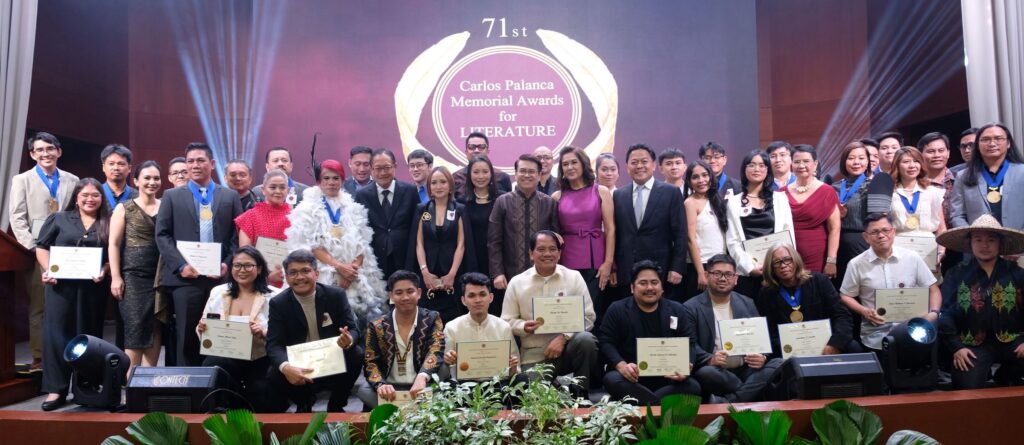
Adding to its multiple local and international accolades was the night’s Gawad Dangal ng Lahi, a special citation granted by the Palanca Awards to those who have contributed immensely to the development of Philippine literature and have aptly become role models for Filipinos.
Named after businessman and philanthropist Don Carlos Palanca Sr. and sponsored by the Carlos Palanca Foundation Inc., the Palanca Awards is the longest-running and most prestigious literary competition in the country. It upholds the tradition of extending incentives for writers to continuously cultivate Philippine literature . A Palanca medal or recognition is highly coveted in the Filipino writing community here and abroad.
Since 1951, the Palanca Awards has conferred medals and certificates to a total of 2,526 Filipino authors, 26 of which became Hall of Fame awardees for having five first prize-winning works. In championing literature, the Palanca Awards also serves as a treasury of our literary gems, currently holding a total of 2,617 winning works in its archives, spanning from 1951 to 2023.
Here is the list of the 71st Palanca Awards winners:
Kabataan Division
Kabataan Sanaysay 1st Prize: No winner 2nd Prize: Amancio A. Caponpon V (“Aranya sa Kisame”) 3rd Prize: Glorious Zavannah Exylin C. Alesna (“Sa Panahon ng Bagabag at Balisa: Paghagilap sa Pira-pirasong Retaso ng Hinahon at Pa(g)hinga”)
Kabataan Essay 1st Prize: Francis Roberto San Antonio Sevillena (“Living on play in a world on pause) 2nd Prize: Glorious Zahara Exylin C. Alesna (“The Bully is you”) 3rd Prize: Rheyn Khrieztine S. Dela Pena (“Five More Minutes, Please!)
Filipino Division
Maikling Kuwento 1st Prize: Peter Solis Nery (“Ang Tariktik”) 2nd Prize: Jay Jomar F. Quintos (“Buwaya”) 3rd Prize: Ella Jane G. Hermonio (“Boses Pusa”)
Maikling Kuwentong Pambata 1st Prize: Jaylord S. Losabia (“Si Toyo at si Suka”) 2nd Prize: Mikka Ann V. Cabangon (“Si Liya at ang Dapithapon sa Ilaya”) 3rd Prize: Iza Maria G. Reyes (“Babasagin, babasagin!”)
Sanaysay 1st Prize: Kimberly Rose L. Pillo (“Kung Paanong Nagmukha akong Sponge sa harap ng mga Pinggan”) 2nd Prize: Al Joseph A. Lumen (“Auslander: Mga Danas sa Alemanya”) 3rd Prize: Edward Joseph Fernandez (“Ako ay si Ako nga”)
Tula 1st Prize: Mikael de Lara Co (“Epistolaryo ng Bagamundo at ang tugon ng Multo”) 2nd Prize: Rogelio dela Rosa Jr. (“Ang Hindi Maiwasang Patlang”) 3rd Prize: Ralph Lorenz G. Fonte, (“Ex Novo Mvndo”)
Tula Para Sa Mga Bata 1st Prize: Dexter B. Gragasin (“Tutula, Tutuli, Tutulo”) 2nd Prize: Genaro R. Gojo Cruz (“Ako, mga tulang pambata”) 3rd Prize: Keisiah Dawn T. Tiaoson (“Tugma ng Buhay kong Payak”)
Dulang May Isang Yugto 1st Prize: Eljay Castro Deldoc (“Ang Lipnayan ng ating mga Katawan”) 2nd Prize: Dan Ian Paulo B. Mariposque (“The Divine Family”) 3rd Prize: Dustin Edward D. Celestino (“Fermata”)
Dulang Ganap Ang Haba 1st Prize: Miguel Antonio Alfredo V. Luarca (“Nekropolis”) 2nd Prize: Christian R. Vallez (“Pingkian”) 3rd Prize: Joshua Lim So (“Atin ang Panahon”)
Dulang Pampelikula 1st Prize: Jonathan P. Jurilla (“Love Child”) 2nd Prize: Jimmy F. Flores (co-author) and Emmanuel Q. Palo (co-author) (“Elehiya”) 3rd Prize: Raymund T. Barcelon (“Beki Naman”)
Regional Division
Short Story-Cebuano 1st Prize: Neile Genica M. Sy (“Lenteng Pilokilay”) 2nd Prize: John Dante (“Ang Magsusulat Nga Haduol na sa Kamatayon”) 3rd Prize: CD Borden (“Alindasay”)
Short Story-Hiligaynon 1st Prize: Ritchie D. Pagunsan (“Kauhaw sa Tingadlaw”) 2nd Prize: Alvin Q. Larida (“Lola Violeta”) 3rd Prize: Serafin I. Plotria, Jr. (“Puno sang Aligotgot”)

Celebrating a month of creativity
Short Story-Ilokano 1st Prize: Rodolfo D. Agatep Jr. (“Diro Ti Disierto”) 2nd Prize: Jorge Richard P. Guerrero (“Idiay Langit, Awan Lanit”) 3rd Prize: Clarito De Francia (“Piglatan”)
English Division
Short Story 1st Prize: Exie Abola (“Vile Creatures”) 2nd Prize: Ian Rosales Casocot (“Don’t Follow Me, I Don’t Even Know Where I’m Going”) 3rd Prize: Katrina D. Torralba (“Amadito and Amanda”)
Short Story For Children 1st Prize: No winner 2nd Prize: Jonny Bernas Pornel (“The Legend of Ipot-ipot”) 3rd Prize: Elvie Victonette B. Razon-Gonzalez (“The Race to Uswag”)
Essay 1st Prize: Rio Renato Pulido Constantino (“The Year of the Periwinkle”) 2nd Prize: Russell Stanley Geronimo (“Profile of a Stateless Person: Notes on a Deportation Proceeding”) 3rd Prize: Francine M. Marquez (“Normalizing Survival”)
Poetry 1st Prize: Patricia Mariya Shishikura (“Translating Wildfires”) 2nd Prize: Vince Raphael V. Agcaoili (“Carrying”) 3rd Prize: Michael Maniquiz (“Lou Reed Meets Delmore Schwartz at a Bar”)
Poetry Written For Children 1st Prize: John Patrick F. Solano (“Odd Numbers”) 2nd Prize: Ian Rosales Casocot (“Bisaya for all that we gugma”) 3rd Prize: Simone Marie Sales (“Paper Planes”)
One-Act Play 1st Prize: Randy Q. Villanueva (“Neneng”) 2nd Prize: Ian Rosales Casocot (“The Midsummer of Manuel Arguilla”) 3rd Prize: Rossielle Sarabia Manicad (“My Lover’s Presscon”)
Full-Length Play 1st Prize: Miguel Antonio Alfredo V. Luarca (“Dogsblood”) 2nd Prize: No winner 3rd Prize: No winner
Share this:
Related stories.

What to expect at Art Fair Philippines 2024

Fred Perry kicks off nightlife campaign with ‘Not Just For Lovers’

The Manila International Book Fair returns in September

The curiosities of BenCab

The new lifestyle.
- About The Post
18 Best Filipino Authors on Your Must-Read List
Are you looking for a new book to read? Check out these 18 best Filipino authors that you will absolutely love.
Many people living in the Philippines have had intense struggles through poverty, crime, and cultural challenges. Those who are skilled writers take those challenges and transform them into great works of literature. If you want to get a feel for the human struggle that the people of the Philippines experiencing, reading one of these Filipino authors could give you that insight.
Throughout the works created by famous authors from the Philippines, you will find something to fit almost any taste. From historic to modern, here are the Filipino authors you need to read.
1. Carlos Bulosan
2. jessica hagedorn, 3. jose rizal, 4. randy ribay, 5. barbara jane reyes, 6. elaine castillo, 7. f. sionil jose, 8. gina apostol, 9. joanne ramos, 10. malaka gharib, 11. melissa de la cruz, 12. mia alvar, 13. nick joaquin, 14. marcelo hilario del pilar y gatmaitan, 15. meredith talusan, 16. lysley tenorio, 17. mia hopkins, 18. tess uriza holthe.
Unlimited access to more than 5,500 nonfiction bestsellers. Free trial available.

Best Filipino Authors Ranked

Born in the Philippines in a small farming village called Mangusmana, Carlos Bulosan came from a family who struggled to make ends meet. Determined to help his family and improve his education, Bulosan emigrated to the United States at the age of 17. He started working low-paying jobs while facing racism and illness until he finally learned how to write and put a voice to the struggles of the Filipino people in the United States.
His best-known work is a semi-autobiographical book called America Is in the Heart. He also wrote The Freedom from Want. Bulosan was both a novelist and a poet, and he died in Washington in 1956. If you enjoyed our round-up of the best Filipino authors, we have many more articles on the best authors from around the globe. You might want to check out our list of the best Korean authors . Or use the search bar at the top right of the page to search for authors in a country or region you are interested in.
- Carlos Bulosan (Author)
- English (Publication Language)
- 327 Pages - 04/01/2014 (Publication Date) - University of Washington Press (Publisher)
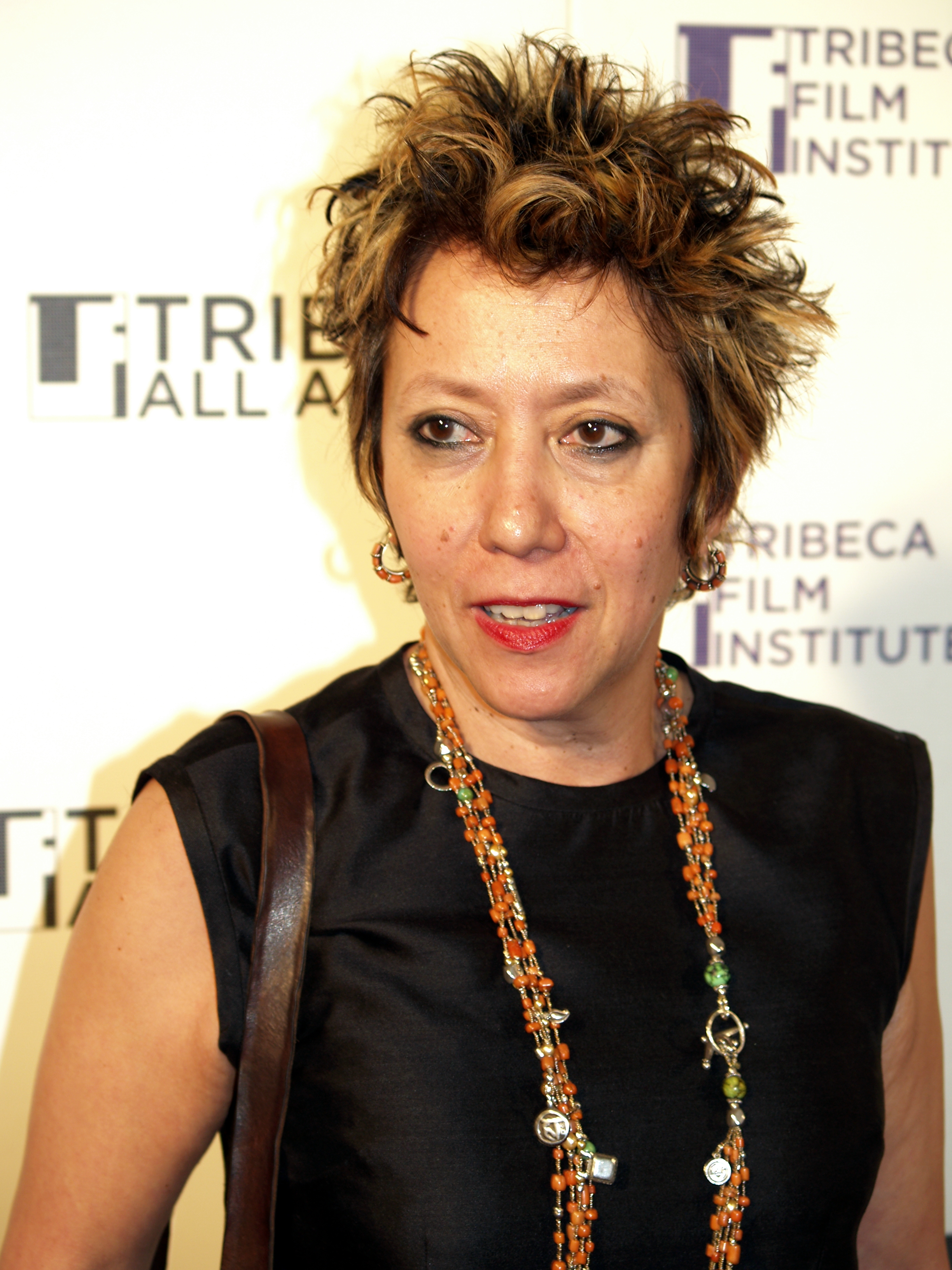
Born in 1949 in Manila, Jessica Hagedorn is a modern playwright, poet and writer. She came to the United States in 1963 to get her education at the American Conservatory Theater training program. She lives in New York City and has won an American Book Award and the Lucille Lotel Foundation fellowship.
Hagedorn has many famous works to her name, but Mango Tango, her first play, is one of her most famous. She also wrote Burning Heart: A Portrait of the Philippines and the fiction novel Dream Jungle.

Jose Rizal came from a wealthy Filipino family He was well-educated and spent much of his time as a young adult traveling Europe to discuss politics. He also studied medicine at the University of Heidelberg and pushed for Filipino reforms under the Spanish authorities. His execution at the age of 36 put a fast end to his writing career.
Rizal wrote a number of poems as a teenager. He also wrote an Operetta called On the Banks of the Pasig. His first novel, Noli Me Tangere, offended the religious leaders of his area and caused him to be deemed a troublemaker. This likely led to his later arrest for political and religious problems.
Randy Ribay is a Filipino author who writes middle-grade and young-adult fiction. Though he was born in the Philippines, he was raised in the United States and majored in English literature at the University of Colorado with a graduate degree from Harvard. In addition to writing, he teaches English in San Francisco.
Ribay’s first works were poetry, but his book Patron Saints of Nothing is an award-winning work of adult fiction. He also wrote An Infinite Number of Parallel Universes and After the Shot Drops. You might also be interested in our round-up of the best Indian authors of all time.

Poet and author Barbara Jane Reyes was born in Manila and moved to the United States as a child. She studied literature and writing in California before launching her award-winning career. She now serves as an adjunct professor at the University of San Francisco.
Reyes’s published works include full-length poetry collections and chapbooks. Gravities of Center, Easter Sunday and Poeta en San Francisco all won awards, including the James Laughlin Award of the Academy of American Poets. Letters to a Young Brown Girl is another popular collection.

Elaine Castillo is an American writer who is of Filipino descent. She studied at the University of California Berkeley and the University of London. She is passionate about equality for the people of the Philippines, and that comes out in her work.
In 2018 Castillo published her first novel America is Not the Heart. Though this is the only publication she has so far, many reviewers consider her an up-and-coming name in literature. NPR named it one of the best books of the year.
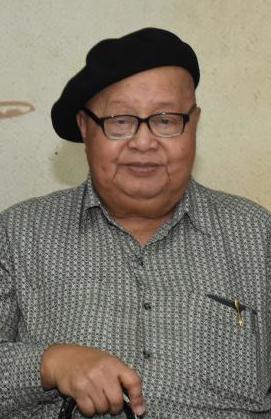
Francisco Sionil Jose was a Filipino writer who is one of the most widely read in the English language. He writes about the social struggles of his culture, and his books and short stories have a huge following. He was born in Pangasinan and attended the University of Santo Tomas before starting his journalism and writing career.
Jose has many novels in his name, including The Pretenders and The Rosales Saga. He also wrote Dusk: A Novel. He won the National Artist of the Philippines award for his literary works. He died at the age of 97 in 2022.

Gina Apostol is a modern Filipino author who was born in Manila and attended Devine World College and the University of the Philippines before coming to the United States to earn her master’s degree at Johns Hopkins University.
Apostol’s first book, Bibliolepsy, recently received republication. She also wrote The Revolution According to Raymundo Mata and Gun Dealers’ Daughter. She has non-fiction works about Filipino American History and short stories to her name as well.

Born in the Philippines, Joanne Ramos moved to Wisconsin when she was just six years old. She attended Princeton University, where she received a bachelor’s degree. She worked in investment banking and private investing before becoming a staff writer for The Economist.
In 2019 Ramos published The Farm, her first novel. It tells the tale of a facility named Golden Oaks, where women serve as surrogate mothers for wealthy clients, and the main character is Filipino, shedding some light on the plight of poor Filipino women and where current cultural ideals could lead them.

Malaka Gharib works for NPR as the digital strategist and deputy editor for their global health and development team. She started this position in 2015, and before that worked with the Malala Fund, which raises money for educational charities.
Gharib is the author of the graphic novel I Was Their American Dream: A Graphic Memoir. It talks about what she faced growing up as a Filipino Egyptian American and introduces young readers to the culture of the Philippines. She also wrote How to Raise a Human and #15Girls, both of which won Gracie Awards.
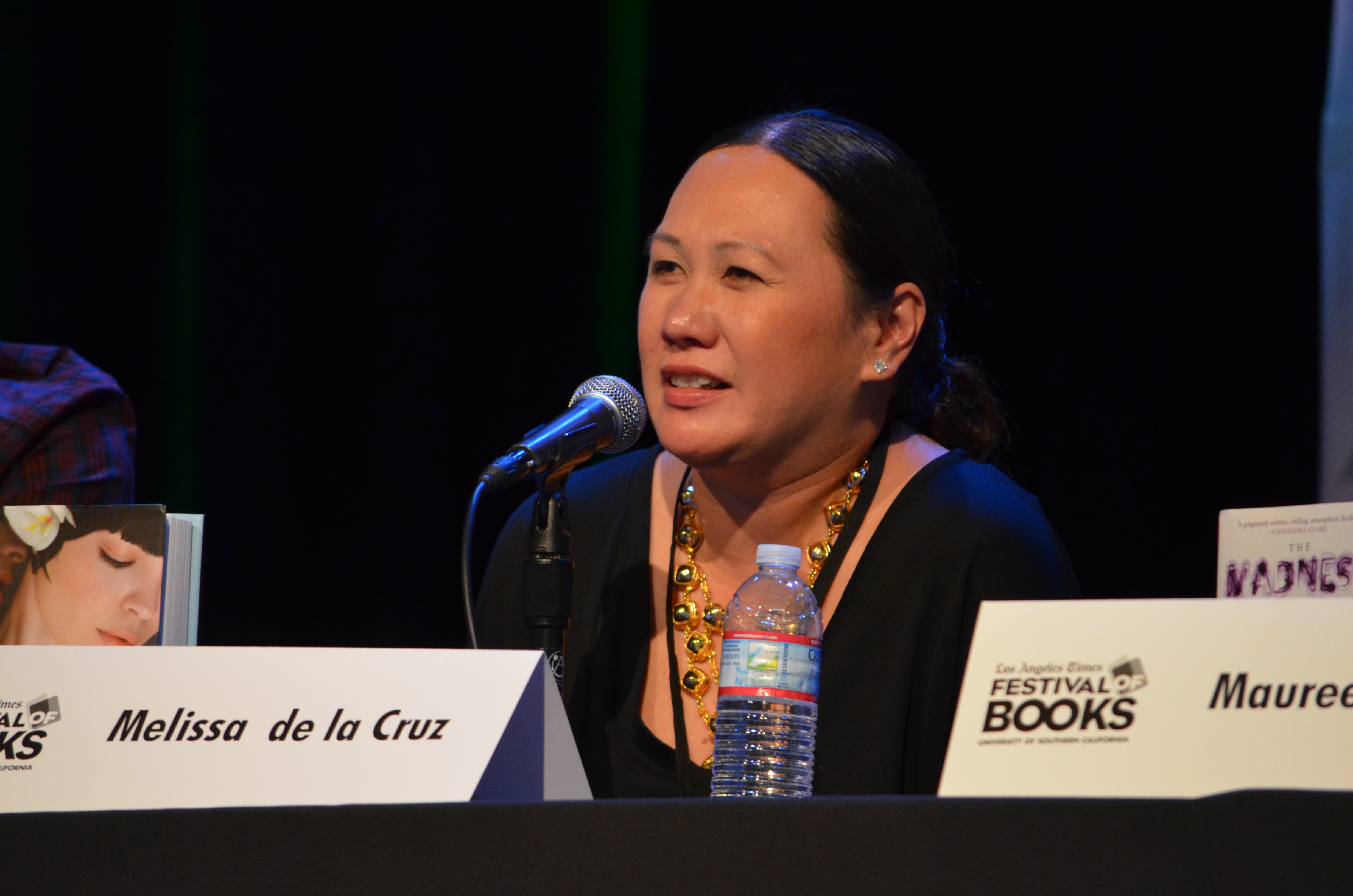
Melissa de la Cruz grew up in Manila and made the move to San Francisco as a teenager. She majored in art history at Columbia University. She lives in West Hollywood, where she continues to write novels and middle-grade fiction.
Many of de la Cruz’s works are quite famous, including several New York Times bestsellers. She published The Isle of the Lost, a prequel to the 2015 Disney movie Descendants, which spent weeks on the bestseller list. She is also famous for her Blue Bloods series, which has three million copies in print, and she has over 50 books to her name.
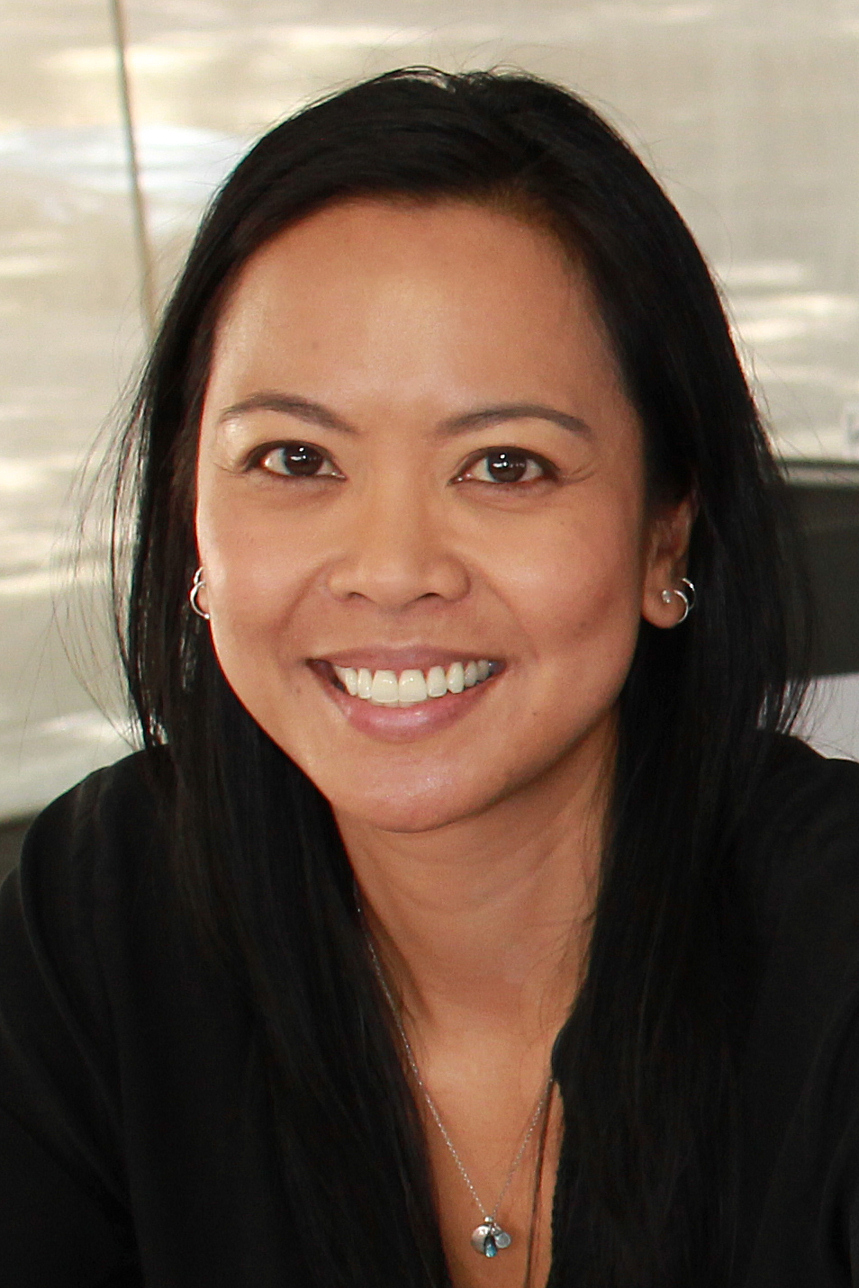
Mia Alvar was born in the Philippines and raised in the United States and Bahrain. She attended Harvard College and Columbia University and currently resides in California.
Alvar won the PEN/Robert W. Bingham Prize for Debut Fiction for her short story collection In the Country. She serves as the writer in residence at the Corporation of Yaddo. Sech also earned the Barnes & Noble Discover Great New Writers award for her work.

Best known for his short stories and novels, Nick Joaquin often wrote under the pen name Quijano de Mania. He was born in 1917 and fought in the Philippine Revolution. After winning a nationwide essay competition, he started contributing poems and stories to magazines and newspapers. He was named the National Artist in 1957.
Joaquin has several novels to his name, including The Woman Who Had Two Navels and A Portrait of the Artist as Filipino. He focused on trying to explain and showcase Filipino culture and its history.
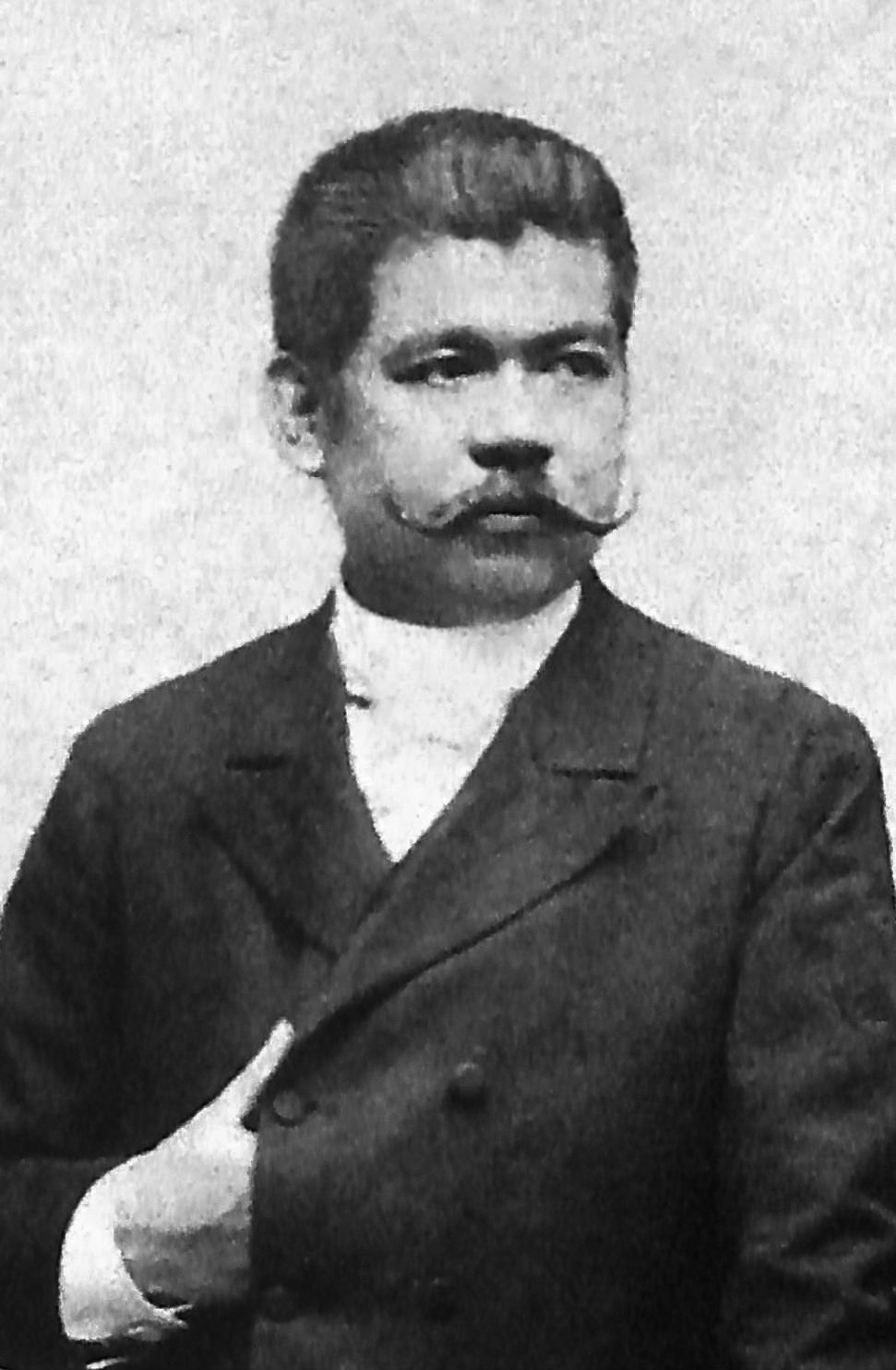
Marcelo Hilario del Pilar y Gatmaitan was often called Plaridel, his pen name. He was born in 1850 and lived in many parts of the Philippines before moving to Barcelona, Spain. Well-educated as a young man, especially in the arts, he became a well-known Filipino writer as an adult. He also attended law school and wrote on legal topics quite often.
Del Pilar was a prolific writer who published many works during his lifetime. The Greatness of God and The Triumph of the Enemies of Progress in the Philippines were some of them.
Meredith Talusan is a Filipino-American author who moved to the United States at the age of 15. He has many excellent essays, stories, and books to her name. She attended Cornell University, where she received an MFA degree, and she worked as a journalist for many well-known publications. In addition to writing, Talusan trained as a dancer.
Talusan has hit the New York Times Bestsellers list with Not That Bad: Dispatches from Rape Culture. She earned the Marsha P. Johnson Fellowship and the Poynter Fellowship at Yale. Many of her books talk about the LGTBQ+ community, and Fairest is her most recent publication.
Lysley Tenorio is a Filipino writer who wrote The Son of Good Fortune and Monstress. His work won many awards, including a National Endowment for the Arts fellowship, an Edmund White Award, and the Rome Prize. Many of his works have become plays.
Tenorio focuses much of his writing on short stories . He was born in the Philippines and moved to San Francisco to pursue his passion for the arts. He works as an associate professor at Saint Mary’s College of California.
Mia Hopkin s is a Filipino-American writer known for her romance novels. She lives in Los Angeles and continues to publish new novels today. She likes to use working-class heroes in her works.
Mia Hopkins’ novels are full of steamy stories. Trashed is one of her most recent, and it is written from the point of view of the anti-hero of her previous novels. Her books have been featured in Entertainment Weekly, USA Today, and The Washington Post. Several of her works are part of a larger series, which gives the reader the chance to get to know her characters.
Tess Uriza Holthe is a Filipino-American writer who was raised in San Francisco. She attended Golden Gate University and works as an accountant in addition to her work as a writer.
Of her books, When the Elephants Dance is her most famous, hitting several national bestseller lists. She wrote the book during her breaks at work, and she drew information from her own father’s experience in the Philippines to inspire the story. She also wrote The Five-Forty-Five to Cannes. If you enjoyed this guide on the top Filipino authors, you might be interested in our round-up of the best Ukrainian authors .
- Subscribe Now
FULL LIST: Winners, Palanca Awards 2022
Already have Rappler+? Sign in to listen to groundbreaking journalism.
This is AI generated summarization, which may have errors. For context, always refer to the full article.
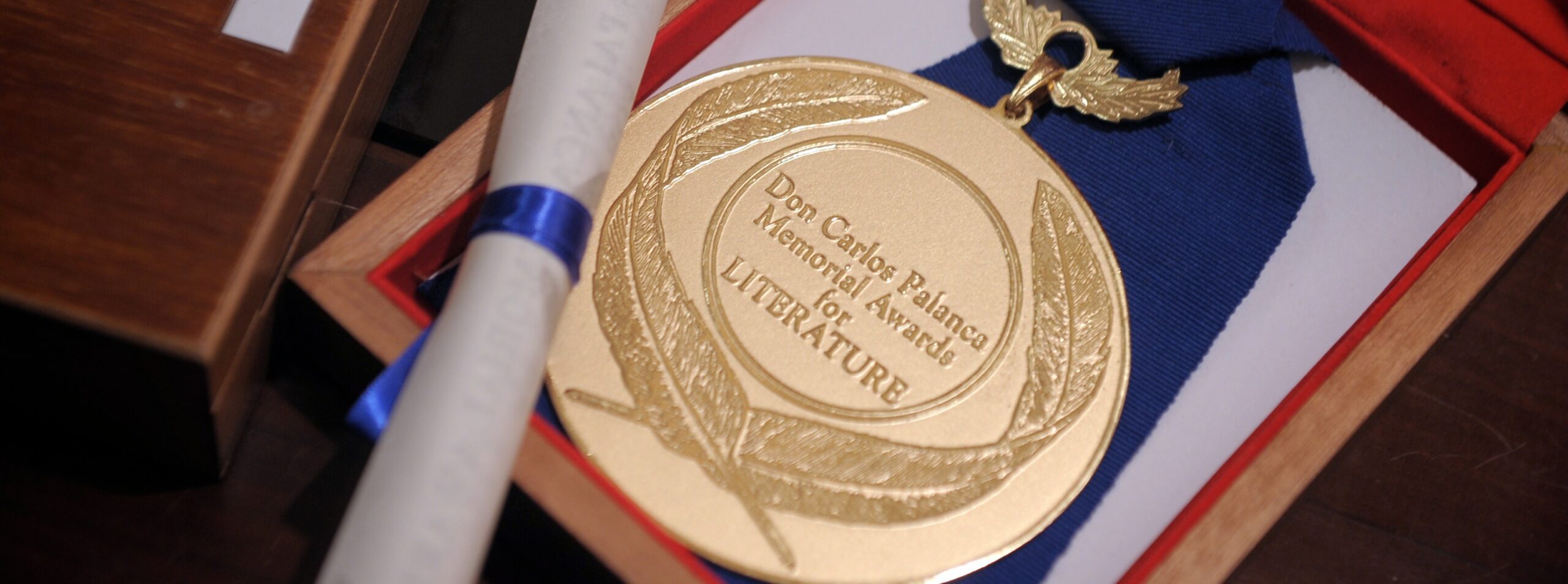
PALANCA AWARDS. The awards honors Filipino writers across 22 writing categories.
Palanca Awards' Facebook
MANILA, Philippines – After a two-year hiatus, the Carlos Palanca Memorial Awards for Literature returned with its 70th edition on Wednesday, November 30.
This year, 59 writers were honored across 22 writing categories, including the bi-annual Novel and Novela categories. Twenty-eight winners were first-time awardees.
UP Film Institute professor emeritus Nicanor Tiongson was this year’s guest of honor and speaker.
Established in 1950, the Palanca Awards was named after businessman and philanthropist Don Carlos Palanca Sr. and “seeks to cultivate Philippine Literature by providing incentives for writers and serving as a treasury of these litery gems.” It is one of the most prominent literary awards in the Philippines.
See the full list of winners here:
Kabataan Division
Kabataan sanaysay.
1st Prize – Glorious Zavannah Exylin C. Alesna, Pamimintana 2nd Prize – Hansly Kendrich C. Saw, Ang Larong Naipanalo Ko 3rd Prize – John Clarence D. Espedido, Mga Bantas ang Nagsilbi kong Guro
Kabataan Essay
1st Prize – Glorious Zahara Exylin C. Alesna, Home is a Bowl of Warm Soup 2nd Prize – Jenine A. Santos, Covid-19 is My Alter Ego 3rd Prize – Gavin Micah T. Herrera, The Social Pandemic
Filipino Division
Maikling kuwento.
1st Prize – Charmaine M. Lasar, Ang Value ng X Kapag Choppy si Mam 2nd Prize – Abegail E. Pariente, Barangay Alitaptap 3rd Prize – Alec Joshua B. Paradeza, Kung sa Bawat Pagtawag ay Pagtawid sa Dagat
Maikling Kuwentong Pambata
1st Prize – Mark Norman S. Boquiren, Si VeRaptor1 Laban kay Trolakuz 2nd Prize – Wilfredo Farrales Sarangaya, Balong Batsit, ang Bidang Bulilit at Bayaning Bulinggit 3rd Prize – Benedick N. Damaso, Mirasol para kay Lola Sol
1st Prize – Venice Kayla Dacanay Delica, Kung Magkapalad Ka’t Mangmang 2nd Prize – Jhon Lester P. Sandigan, Tatlong Pancit Canton 3rd Prize – Nathaniel R. Alcantara, Isang Dekadang Kontrata sa Piling ng mga Mikrobyo
1st Prize – Ralph Lorenz G. Fonte, Uyayi ng mga Patay na Buwan 2nd Prize – Enrique S. Villasis, Pintula 3rd Prize – Sonny C. Sendon, Mga Anino sa Guho at iba pang mga tula
Tula Para sa Mga Bata
1st Prize – Christian R. Vallez, Tula, Tula, Paano ka Ginawa? 2nd Prize – Rebecca T. Anonuevo, Ale Bangbang 3rd Prize – Ninia H. dela Cruz, Mga Pahina sa Alaala ng Nanay
Dulang May Isang Yugto
1st Prize – Andrew Bonifacio L. Clete, Punks Not Dead 2nd Prize – Layeta P. Bucoy, Dance of the Foolies 3rd Prize – Ryan Machado, Huling Haraya nina Ischia at Emeteria
Dulang Ganap ang Haba
1st Prize – Joshua Lim So, Mga Silid ng Unos: Tomo Uno 2nd Prize – Rodolfo C. Vera, Anak Datu 3rd Prize – Steven Prince C. Fernandez, Badung
Dulang Pampelikula
1st Prize – Avelino Mark C. Balmes, Jr., Amoy Pulbos 2nd Prize – Noreen Besmar Capili, DOS 3rd Prize – Ehdison M. Dimen, Ang Pananalangin sa Getsemani
Regional Division
Short story – cebuano.
1st Prize – Noel P. Tuazon, Barang 2nd Prize – Manu Avenido, Ikigai 3rd Prize – Januar E. Yap, John Wayne ug ang Goldfish kong Inahan
Short Story – Hiligaynon
1st Prize – Peter Solis Nery, Ang Macatol Kag Ang “Queen of Relief” 2nd Prize – Early Sol A. Gadong, Malipayon nga Katapusan 3rd Prize – Ritchie D. Pagunsan, Esperanza
Short Story – Ilokano
1st Prize – Oswald Ancheta Valente, Ti Kimat Ken Ti Silag 2nd Prize – Remedios S. Tabelisma-Aguillon, Ti Ubing 3rd Prize – Rodolfo D. Agatep Jr., Karton
English Division
Short story.
1st Prize – Ian Rosales Casocot, Ceferina in Apartment 2G 2nd Prize – Exie Abola, Ardor 3rd Prize – Hammed Bolotaolo, The Money Changer
Short Story for Children
1st Prize – NO WINNER 2nd Prize – Elyrah L. Salanga-Torralba, Cloud Keeper 3rd Prize – Heather Ann Ferrer Pulido, My Grandma who lives in Half a House
1st Prize – Alfonso Tomas P. Araullo, Letter from Tawi-Tawi 2nd Prize – Michaela Sarah De Leon, Filipino Millennial Monomyth 3rd Prize – Alexandra Francesca A. Bichara, The Helmsman’s Daughter
1st Prize – Ramil Digal Gulle, Bol-anon Prodigal 2nd Prize – Soleil David, A Few Dawns from now, A Sunfish 3rd Prize – Lawrence Anthony R. Bernabe, The Blueline
Poetry Written for Children
1st Prize – Elyrah L. Salanga-Torralba, An Empty Chair in the Corner 2nd Prize – Peter Solis Nery, Picnic, Symphony and other concepts a 4th Grader needs to know 3rd Prize – NO WINNER
One-Act Play
1st Prize – Ronald S. Covar, The Cave Dwellers 2nd Prize – Bonifacio P. Ilagan, Salvaged Eman 3rd Prize – Maria Kristine B. Roxas-Miller, Agencia Feliz
Full-length Play
1st Prize – Layeta P. Bucoy, Orgullo Compound 2nd Prize – Jay Mariano Crisostomo IV, Black Bordello 3rd Prize – Dustin Edward D. Celestino, The Lost Filipino Patriots of America
Grand Prize – Raymundo T. Pandan, Jr, Bittersweetland Special Prize – Alvin Dela Serna Lopez, 1762
Grand Prize (Pangunahing Gantimpala) – Khavn, ANTIMARCOS Special Prize (Natatanging Gantimpala) – Edgar Calabia Samar, Teorya ng Unang Panahon
– Rappler.com
Add a comment
Please abide by Rappler's commenting guidelines .
There are no comments yet. Add your comment to start the conversation.
How does this make you feel?
Related Topics
Recommended stories, {{ item.sitename }}, {{ item.title }}.
Checking your Rappler+ subscription...
Upgrade to Rappler+ for exclusive content and unlimited access.
Why is it important to subscribe? Learn more
You are subscribed to Rappler+
- The UP Charter
- University Seal
- University Administration
- UP Strategic Plan 2023-2029
- UP and the SDGs
- University Quality Policy
- Principles on Artificial Intelligence
- International Linkages
- Budget and Finances
- Academic Programs
- Constituent Universities
- Undergraduate Admissions | UPCAT
- Varsity Athletic Admission System
- Graduate Admissions
- Philosophy of Education
- Student Learning Assistance System
- Frequently Asked Questions
- Academics and Research
- Public Service
- Search for: Search Button
I am a Filipino
I am a Filipino is an essay written by Carlos Peña Romulo, Sr. which was printed in The Philippines Herald on August 16, 1941.
A Pulitzer Prize winner, passionate educator, intrepid journalist and effective diplomat, Romulo graduated from the University of the Philippines in 1918 with a Bachelor of Arts in Liberal Arts and Sciences degree. He earned his Master of Arts degree in Philosophy from Columbia University in 1921. He would join the ranks of the UP faculty in 1923 as an Associate Professor in what was then the English Department. He would be later be appointed to the Board of Regents in 1931. Almost three decades later, he would once again be reunited with the University, serving as its 11th President in 1962.

I am a Filipino–inheritor of a glorious past, hostage to the uncertain future. As such I must prove equal to a two-fold task–the task of meeting my responsibility to the past, and the task of performing my obligation to the future.
I sprung from a hardy race, child many generations removed of ancient Malayan pioneers. Across the centuries the memory comes rushing back to me: of brown-skinned men putting out to sea in ships that were as frail as their hearts were stout. Over the sea I see them come, borne upon the billowing wave and the whistling wind, carried upon the mighty swell of hope–hope in the free abundance of new land that was to be their home and their children’s forever.
This is the land they sought and found. Every inch of shore that their eyes first set upon, every hill and mountain that beckoned to them with a green-and-purple invitation, every mile of rolling plain that their view encompassed, every river and lake that promised a plentiful living and the fruitfulness of commerce, is a hallowed spot to me.
By the strength of their hearts and hands, by every right of law, human and divine, this land and all the appurtenances thereof–the black and fertile soil, the seas and lakes and rivers teeming with fish, the forests with their inexhaustible wealth in wild life and timber, the mountains with their bowels swollen with minerals–the whole of this rich and happy land has been, for centuries without number, the land of my fathers. This land I received in trust from them and in trust will pass it to my children, and so on until the world is no more.
I am a Filipino. In my blood runs the immortal seed of heroes–seed that flowered down the centuries in deeds of courage and defiance. In my veins yet pulses the same hot blood that sent Lapulapu to battle against the first invader of this land, that nerved Lakandula in the combat against the alien foe, that drove Diego Silang and Dagohoy into rebellion against the foreign oppressor.
That seed is immortal. It is the self-same seed that flowered in the heart of Jose Rizal that morning in Bagumbayan when a volley of shots put an end to all that was mortal of him and made his spirit deathless forever, the same that flowered in the hearts of Bonifacio in Balintawak, of Gregorio del Pilar at Tirad Pass, of Antonio Luna at Calumpit; that bloomed in flowers of frustration in the sad heart of Emilio Aguinaldo at Palanan, and yet burst forth royally again in the proud heart of Manuel L. Quezon when he stood at last on the threshold of ancient Malacañan Palace, in the symbolic act of possession and racial vindication.
The seed I bear within me is an immortal seed. It is the mark of my manhood, the symbol of dignity as a human being. Like the seeds that were once buried in the tomb of Tutankhamen many thousand years ago, it shall grow and flower and bear fruit again. It is the insignia of my race, and my generation is but a stage in the unending search of my people for freedom and happiness.
I am a Filipino, child of the marriage of the East and the West. The East, with its languor and mysticism, its passivity and endurance, was my mother, and my sire was the West that came thundering across the seas with the Cross and Sword and the Machine. I am of the East, an eager participant in its spirit, and in its struggles for liberation from the imperialist yoke. But I also know that the East must awake from its centuried sleep, shake off the lethargy that has bound his limbs, and start moving where destiny awaits.
For I, too, am of the West, and the vigorous peoples of the West have destroyed forever the peace and quiet that once were ours. I can no longer live, a being apart from those whose world now trembles to the roar of bomb and cannon-shot. I cannot say of a matter of universal life-and-death, of freedom and slavery for all mankind, that it concerns me not. For no man and no nation is an island, but a part of the main, there is no longer any East and West–only individuals and nations making those momentous choices which are the hinges upon which history resolves.
At the vanguard of progress in this part of the world I stand–a forlorn figure in the eyes of some, but not one defeated and lost. For, through the thick, interlacing branches of habit and custom above me, I have seen the light of the sun, and I know that it is good. I have seen the light of justice and equality and freedom, my heart has been lifted by the vision of democracy, and I shall not rest until my land and my people shall have been blessed by these, beyond the power of any man or nation to subvert or destroy.
I am a Filipino, and this is my inheritance. What pledge shall I give that I may prove worthy of my inheritance? I shall give the pledge that has come ringing down the corridors of the centuries, and it shall be compounded of the joyous cries of my Malayan forebears when first they saw the contours of this land loom before their eyes, of the battle cries that have resounded in every field of combat from Mactan to Tirad Pass, of the voices of my people when they sing:
Land of the morning, Child of the sun returning– Ne’er shall invaders Trample thy sacred shore.
Out of the lush green of these seven thousand isles, out of the heartstrings of sixteen million people all vibrating to one song, I shall weave the mighty fabric of my pledge. Out of the songs of the farmers at sunrise when they go to labor in the fields, out of the sweat of the hard-bitten pioneers in Mal-lig and Koronadal, out of the silent endurance of stevedores at the piers and the ominous grumbling of peasants in Pampanga, out of the first cries of babies newly born and the lullabies that mothers sing, out of the crashing of gears and the whine of turbines in the factories, out of the crunch of plough-shares upturning the earth, out of the limitless patience of teachers in the classrooms and doctors in the clinics, out of the tramp of soldiers marching, I shall make the pattern of my pledge:
“I am a Filipino born to freedom, and I shall not rest until freedom shall have been added unto my inheritance—for myself and my children and my children’s children—forever.”
Share this:
University of the philippines.
University of the Philippines Media and Public Relations Office Fonacier Hall, Magsaysay Avenue, UP Diliman, Quezon City 1101 Telephone number: (632) 8981-8500 Comments and feedback: [email protected]
University of the Philippines © 2024
UP would continue expanding under Villamor’s watch, with the Conservatory of Music; the University High School; the College of Education; and, the Junior College in Cebu City added under his watch
The School of Fine Arts (1909), the College of Liberal Arts (1909), the College of Veterinary Medicine (1910), the College of Engineering (1910), the College of Agriculture (1906, in Los Baños, Laguna) follow to form the initial core of the newly established UP.
The UP College of Medicine (then known as the Philippine Medical School) opens. It predates the opening of the University proper by 3 years.

By providing an email address. I agree to the Terms of Use and acknowledge that I have read the Privacy Policy .
54 writers win at the 71st Palanca Awards
MANILA, Philippines — The awarding ceremony for the 71st Carlos Palanca Memorial Awards for Literature was held on Monday at the Philippine International Convention Center.
Fifty-four winners across 20 categories in English, Filipino, and other Philippine regional languages were lauded. All in all, there are fifty-six winning works this year.
Below are the winners of the ceremony:
English Division
Short Story
- First Prize – Exie Abola – ‘Vile Creatures’
- Second Prize – Ian Rosales Casocot – ‘Don’t Follow Me, I Don’t Even Know Where I’m Going’
- Third Prize – Katrina D. Torralba – ‘Amadito and Amanda’
Short Story for Children
- First Prize – No winner
- Second Prize – Jonny Bernas Pornel – ‘The Legend of Ipot-ipot’
- Third Prize – Elvie Victonette B. Razon-Gonzalez – ‘The Race to Uswag’
Essay
- First Prize – Rio Renato Pulido Constantino – ‘The Year of the Periwinkle’
- Second Prize – Russell Stanley Geronimo- ‘Profile of a Stateless Person: Notes on a Deportation Proceeding’
- Third Prize – Francine M. Marquez – ‘Normalizing Survival’
Poetry
- First Prize – Patricia Mariya Shishikura – ‘Translating Wildfires’
- Second Prize – Vince Raphael V. Agcaoili – ‘Carrying’
- Third Prize – Michael Maniquiz – ‘Lou Reed Meets Delmore Schwartz at a Bar’
Poetry Written for Children
- First Prize – John Patrick F. Solano – ‘Odd Numbers’
- Second Prize – Ian Rosales Casocot – ‘Bisaya for all that we gugma’
- Third Prize – Simone Marie Sales – ‘Paper Planes’
One-Act Play
- First Prize – Randy Q. Villanueva – ‘Neneng’
- Second Prize – Ian Rosales Casocot – ‘The Midsummer of Manuel Arguilla’
- Third Prize – Rossielle Sarabia Manicad – ‘My Lover’s Presscon’
Full-Length Play
- First Prize – Miguel Antonio Alfredo V. Luarca – ‘Dogsblood’
- Second Prize – No winner
- Third Prize – No winner
Filipino Division
Maikling Kuwento (Short Story in Filipino)
- First Prize – Peter Solis Nery – ‘Ang Tariktik’
- Second Prize – Jay Jomar F. Quintos – ‘Buwaya’
- Third Prize – Ella Jane G. Hermonio – ‘Boses Pusa’
Maikling Kuwentong Pambata (Short Story for Children in Filipino)
- First Prize – Jaylord S. Losabia – ‘Si Toyo at si Suka’
- Second Prize – Mikka Ann V. Cabangon – “Si Liya at ang Dapithapon sa Ilaya”
- Third Prize – Iza Maria G. Reyes -‘Babasagin, babasagin!’
Sanaysay (Essay in Filipino)
- First Prize – Kimberly Rose L. Pillo – ‘Kung Paanong Nagmukha akong Sponge sa harap ng mga Pinggan’
- Second Prize – Al Joseph A. Lumen – ‘Auslander: Mga Danas sa Alemanya’
- Third Prize – Edward Joseph Fernandez – ‘Ako ay si Ako nga’
Tula (Poetry in Filipino)
- First Prize – Mikael de Lara Co – ‘Epistolaryo ng Bagamundo at ang tugon ng Multo’
- Second Prize – Rogelio dela Rosa Jr. – ‘Ang Hindi Maiwasang Patlang’
- Third Prize – Ralph Lorenz G. Fonte, M.D. – ‘Ex Novo Mvndo’
Tulang Isinulat Para sa mga Bata (Poetry for Children in Filipino)
- First Prize – Dexter B. Gragasin – ‘Tutula, Tutuli, Tutulo’
- Second Prize – Genaro R. Gojo Cruz – ‘Ako, mga tulang pambata’
- Third Prize – Keisiah Dawn T. Tiaoson – ‘Tugma ng Buhay kong Payak’
Dulang May Isang Yugto (One-Act Play in Filipino)
- First Prize – Eljay Castro Deldoc – ‘Ang Lipnayan ng ating mga Katawan’
- Second Prize – Dan Ian Paulo B. Mariposque – ‘The Divine Family’
- Third Prize – Dustin Edward D. Celestino – ‘Fermata’
Dulang Ganap ang Haba (Full-Length Play in Filipino)
- First Prize – Miguel Antonio Alfredo V. Luarca – ‘Nekropolis’
- Second Prize – Christian R. Vallez – ‘Pingkian’
- Third Prize – Joshua Lim So – ‘Atin ang Panahon’
Dulang Pampelikula (Screenplay in Filipino)
- First Prize – Jonathan P. Jurilla – Love Child
- Second Prize – Jimmy F. Flores and Emmanuel Q. Palo – ‘Elehiya’
- Third Prize – Raymund T. Barcelon – ‘Beki Naman’
Regional Languages Division
Short Story in Cebuano
- First Prize – Neile Genica M. Sy – ‘Lenteng Pilokilay’
- Second Prize – John Dante – ‘Ang Magsusulat Nga Haduol na sa Kamatayon’
- Third Prize – CD Borden – ‘Alindasay’
Short Story in Hiligaynon
- First Prize – Ritchie D. Pagunsan – ‘Kauhaw sa Tingadlaw’
- Second Prize – Alvin Q. Larida – ‘Lola Violeta’
- Third Prize – Serafin I. Plotria, Jr. – ‘Puno sang Aligotgot’
Short Story in Ilokano
- First Prize – Rodolfo D. Agatep Jr. – ‘Diro Ti Disierto’
- Second Prize – Jorge Richard P. Guerrero – ‘Idiay Langit, Awan Lanit’
- Third Prize – Clarito De Francia – ‘Piglatan’
Kabataan Division (Below 18 years old)
Kabataan Essay – The theme for the essay is ”Emerging out of the Pandemic, what are the most pressing issues surrounding mental health among youth and how can Society and Government help in addressing these concerns for the growth and well-being of our younger generations?”
- First Prize – Francis Roberto San Antonio Sevillena – ‘Living on play in a world on pause’
- Second Prize – Glorious Zahara Exylin C. Alesna – ‘The Bully is you’
- Third Prize – Rheyn Khrieztine S. Dela Pena – ‘Five More Minutes, Please!’
Kabataan Sanaysay – The theme for the essay is “Sa pagsulong mula sa Pandemya, ano ang mga pinakamabibigat na isyung pumapalibot sa kalusugan ng isip ng mga kabataan, at paano makatutulong ang Lipunan at Pamahalaan na tugunan ang mga ito para sa ikauunlad at ikabubuti ng ating mga nakababatang henerasyon?””
- First Prize – No winner
- Second Prize – Amancio A. Caponpon V – ‘Aranya sa Kisame’
- Third Prize – Glorious Zavannah Exylin C. Alesna – ‘Sa Panahon ng Bagabag at Balisa: Paghagilap sa Pira-pirasong Retaso ng Hinahon at Pa(g)hinga’
RELATED STORIES
NBDB releases list of finalists for 41st National Book Awards
Subscribe to our daily newsletter
Writing as revolutionary act: 70 cycles of the Palanca Awards
Disclaimer: Comments do not represent the views of INQUIRER.net. We reserve the right to exclude comments which are inconsistent with our editorial standards. FULL DISCLAIMER
© copyright 1997-2024 inquirer.net | all rights reserved.
This is an information message
We use cookies to enhance your experience. By continuing, you agree to our use of cookies. Learn more here.
By providing an email address. I agree to the Terms of Use and acknowledge that I have read the Privacy Policy .
Winners of Overseas Filipinos essay contest honored
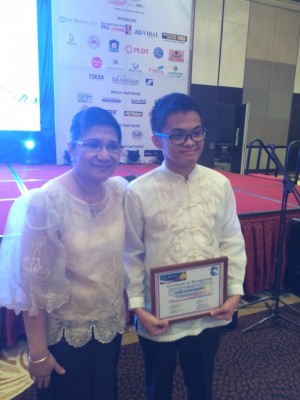
Dr. Celia Lamkin with Justin Keith Baquisal of UP Diliman, grand winner of Essay Contest on Overseas Filipinos during the awards ceremony on February 26, at Manila Hotel. CONTRIBUTED PHOTOS
MANILA – Winners of the Essay Contest on Overseas Filipinos were feted during an awards ceremony February 26 at the Manila Hotel during the gala dinner of the Third Global Summit of Filipinos in the Diaspora held in Manila.
The essay contest with the theme “The Overseas Filipinos and their impact on the Philippines” was launched by the US Pinoys for Good Governance Marianas chapter (CNMI and Guam) Chairperson Dr. Celia Lamkin in collaboration with the Commission on Overseas and its chairperson, Secretary Imelda Nicolas.
There were 257 essay entries received by the USP4GG Ad Hoc Committee from both College and High School Categories from nine different countries: Philippines, USA, Greece, Kingdom of Saudi Arabia, United Arab Emirates, China, Bahrain, Qatar.
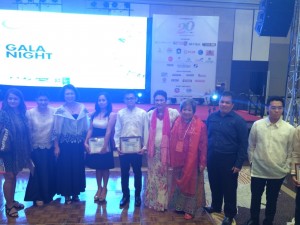
(From left) Mrs. Jeremias, mother of Hazel Ivy Jeremias, 2nd prize winner (High School category) of The Lewis College in Sorsogon City, Dr. Celia Lamkin, Atty. Loida Nicolas Lewis, Hazel Ivy Jeremias, 2nd prize winner, Justin Keith Baquisal, grand winner (College category), CFO Secretary Imelda Nicolas, Atty. Lolita Farmer, Mr. Jefferson Baquisal, father of Justin Keith Baquisal, and Jeremy Mosquito, 3rd prize winner (College category) of St. Mary’s University at Bayombong, Nueva Viscaya.
Philippine President Benigno S. Aquino III sent congratulations to the winners: “Our countrymen have sacrificed much so that we can build upon the foundations they toiled for us. Let your perspectives and insights motivate our kababayans to intensify their support for our fellows in distant shores.” The winners are the following:
College Category Justin Keith Baquisal – First Prize of the University of the Philippines, Diliman Dia Marmi Bazar – Second Prize of Misamis University at Misamis Occidental Jeremy Mosquito- Third Prize of St. Mary’s University at Bayombong, Nueva Viscaya
High School Patrick Duane Noche – First Prize of Calayan Educational Foundation,Inc at Lucena city Eugenie Marie Pranada – First Prize of Philippine School of Bahrain Hazel Ivy Jeremias – Second Prize of The Lewis College at Sorsogon city Yvonne Dayne Luis -Third Prize of Durat Al Sharq International School at Jeddah, Kingdom of Saudi Arabia
Grand winner Justin Keith Baquisal said, “As mass out-migration has become a trend since the 1970’s, the task for today’s generation is to critically examine the phenomenon and its effects on our private lives and public issues. I think we should continue to locate the overseas Filipino community in the narrative of our nationhood. They may be geographically far from us, often becoming citizens of other states either by economic necessity or free will, but I think their experiences should vitalize rather than be relegated from talks about national development.”
Eugenie Marie Pranada said, “The topic of the essay contest is timely, challenging, and relevant. The contest provided channels from the youth around the globe to come to one destination -the hearts of the OFWs. Also, this aided the realization and the discovery of the reader on what views the author has to offer to the world. Lastly, like any other writing competitions, all the contenders let their hearts speak. That’s how we won…the experience.”
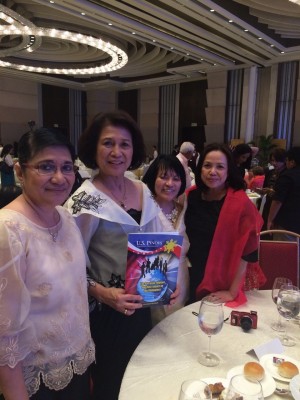
(From left) Dr. Celia Lamkin, USP4GG Marianas chapter chair; Atty. Loida Nicolas Lewis, USP4GG national chair; Aurora Aguinaldo, USP4GG member from New York; Treenee Lopez, Chairperson of Global Pinoys Diaspora in Canada.
The judges of the essay contest were:
Dr. Josefina G. Tayag,DPA, retired vice-chancellor of UP Manila; Zaldy Dandan, editor of Marianas Variety, Atty.Lolita Farmer,OAM, an immigration lawyer in Australia; George Chua, President and CEO of Bayan Automative Industries Corporation and President of Philippine Industries ( FPI) ; Mithi Aquino-Thomas, an experienced instructor and trainer in the customer service industry and wife of former US Ambassador to the Philippines Harry Thomas, Jr.
Gene Alcantara, chair of the European Network of Filipino Diaspora ( ENFiD) and immigration consultant in London; Juanita Nimfa Gamez, one of the 100 Most Influential Filipinas in the US in 2007 and CEO and president of a home care business in California; Romy Cayabyab, founder and publisher of the award-winning Internet publishing and media company in Sydney, Australia.
Subscribe to our daily newsletter
Ferth Vandensteen Manaysay, grand winner of USP4GG Essay Contest on West Philippine Sea and a community journalist/reporter for the Sun Star Publishing,Inc; and Dr. Celia B. Lamkin, chairperson of the Ad Hoc Committee for USP4GG Essay Contest on Overseas Filipinos, founding chairperson of Global Filipino Diaspora Marianas and founding member, Board Member and Secretary of Global Filipino Diaspora Council.
Subscribe to our global news
Disclaimer: Comments do not represent the views of INQUIRER.net. We reserve the right to exclude comments which are inconsistent with our editorial standards. FULL DISCLAIMER
© copyright 1997-2024 inquirer.net | all rights reserved.
This is an information message
We use cookies to enhance your experience. By continuing, you agree to our use of cookies. Learn more here.

University of the Philippines Diliman
Carlos palanca memorial award for literature.
Organized by the Carlos Palanca Foundation, The Carlos Palanca Memorial Awards for Literature (CPMAL) is the longest running literary award in the Philippines. CPMAL was established in 1950 to inspire Filipino writers to improve their literary works. In the 1960s, the Palanca Awards Committee began committing funds to the publication of Palanca Award-winning plays. By 1975, funds were committed to productions. In 2009, it added a category for poetry for children in both Filipino and English.
Evasco, Eugene Y. (2nd Prize, Maikling Kwentong Pambata, “Siyap ng Isang Sisiw”)
Ortiz, Will P. (2nd Prize, Tula Para sa mga Bata, “Himbing na Kuting at Iba Pang Tula sa Ilalim ng Araw”)
Sicat–Cleto, Luna (3rd Prize, Maikling Kwento, “Tatlong Proposisyon ng Putting Hangin”)
Evasco, Eugene Y. (1st Prize, Sanaysay, “Ang Mapa ng Taglagas sa Aking Maleta”)
Dalisay, Jose Jr. (Gawad Dangal ng Lahi)
Evasco, Eugene Y. (2nd Prize, Sanaysay, “Mga Pagsasanay sa Paggalugad ng Siyudad”; 3rd Prize, Maikling Kuwentong Pambata, “Ambon ng Liwanag”)
Mabesa, Antonio (Gawad Dangal ng Lahi)
Suarez, Larissa Mae R. (2nd Prize, Shot Story, “Sundays at the Cardozas’”)
Falgui, Raymond G. (1st Prize, Short Story for Children, “Monster Rescue: A Children’s Story for Adult Readers”)
Gonzales, Vladimeir B. (2nd Prize, Dulaang May Isang Yugto, “Mal”)
Guieb, Eli III R. (1st Prize, Essay, “Symphony of Dry Winds in a Time without Rain)
Evasco, Eugene (1st Prize, Short Story in Filipino, “Ang Nag-iisa at Natatanging si Onyok”)
Salanga-Torralba, Elyra (2nd Prize, Poetry Written for Children, “Punny Poems”)
Evasco, Eugene (1st Prize, Poetry for Children in Filipino, “Harana ng Kuliglig”; 2nd Prize, Short Story for Children in Filipino, “Ang Singsing Pari para Sa Pisara” co-authored with Chris Martinez)
Neri, Bernadette V. (2nd Prize, Short Story in Filipino, “Pamamanhikan”; 3rd Prize, One-Act Play in Filipino, “Pamamanhikan”)
Santiago, Lilia Quindoza (1st Prize, Short Story in Filipino, “Bayanggudaw”)
Neri, Bernadette V. (2nd Prize, Short Story for Children in Filipino, “Atang sa Kaluluwa nina Apong Salawal at Apong Saya”)
Ortiz, Will P. (1st Prize, Short Story for Children in Filipino, “Ang Tatlong Bubwit at Bangkang Marikit”)
Salanga-Torralba, Elyrah (2nd Prize, Essay in Filipino, “Utang Ina”)
Lucero, Rosario Cruz (3rd Prize, Essay in English, “The Stain of Blackberries”)
Evasco, Eugene (2nd Prize, Poetry for Children in Filipino, “Isang Mabalahibong Bugtong”)
Neri, Bernadette V. (1st Prize, Essay in Filipino, “Ang Pag-uwi ng Alibughang Anak ng Lupa”)
Torres-Yu, Rosario (2nd Prize, Essay in Filipino, “Nagbibihis na ang Nanay”)
Baquiran, Romulo Jr. P. (2nd Prize, Poetry in Filipino, “Parokya”)
Ortiz, Will P. (3rd Prize, Poetry for Children in Filipino, “May Puso ang Saging”)
Neri, Bernadette V. (3rd Prize, Short Story for Children in Filipino, “Parada ng mga Alingawngaw”)
Rodriguez, Rommel (2nd Prize, Short Story in Filipino, “Toxic”)
Abad, Heidi Emily Eusebio (2nd Prize, Poetry for Children in English, “Child of Earth Poems”)
Aguila, Reuel Molina (1st Prize, Essay in Filipino, “Ngunit Wala Akong Litrato Noong Nasa Kolehiyo Ako”; and 2nd Prize, Full Length Play in Filipino, “Sa Kanto ng Wakas at Katotohanan Ext.”)
Evasco, Eugene (1st Prize, Poetry for Children in Filipino, “May Tiyanak sa Loob ng Aking Bag”)
Landicho, Domingo (3rd Prize, Essay in Filipino, “Kamay”)
Naval, Jimmuel C. (3rd Prize, Short Story in Filipino, “Ang Kamatayan ng Isang Linggo”)
Tiatco, Sir Anril P. (3rd Prize, Full Length Play in Filipino, “Miss Dulce Extranjera”)
Evasco, Eugene (2nd Prize, Essay in Filipino, “Agaw-buhay”)
Rodriguez, Rommel (3rd Prize, Short Story in Filipino, “Kabagyan”)
Andrada, Michael Francis (1st Prize, Futuristic Fiction in Filipino, “Tala-Huli/Huling Tala: Si Manong, Sa Dyip, Ang Drayber at Ako, Ako Lang Naman, Ang Kanyang Pasahero”)
Bonifacio, Amelia L. (2nd Prize, Full Length Play in English, “Chinchina and the Five Mountains”)
Gonzales, Vladimeir B. (3rd Prize, Futuristic Fiction in Filipino, “Lunes, Alas Diyes ng Umaga”)
Neri, Bernadette V. (1st Prize, Short Story for Children in Filipino, “Ang Ikaklit sa Aming Hardin”)
Salanga, Elyrah (2nd Prize, Essay in Filipino, “Talambalay”)
Torres-Yu, Rosario (1st Prize, Essay in Filipino, “Batang Tundo”)
Toledo, Joel (1st Prize, Poetry in English, “What Little I know of Luminosity”)
Evasco, Eugene (2nd Prize, Short Story for Children in Filipino, “Si Mabait at ang mga Daliri ng Liwanag”)
Flores, Maria Celeste (2nd Prize, Short Story for Children in English, “Touch Ball”) Sicat-Cleto, Luna (1st Prize, Essay in Filipino, “Balanse”)
Lucero, Rosario Cruz (1st Prize, Essay in English, “The Music of Pestle-on-Mortar”)
Manalo, Paolo (1st Prize, Poetry in English, “Jolography”)
Naval, Jimmuel (3rd Prize, Futuristic Fiction in Filipino, “Mr. Doily”)
Aguila, Reuel Molina (1st Prize, Future Fiction in Filipino, “Ampalaya”)
Cruz, Conchitina (2nd Prize, Poetry in English, “The Shortest Distance”)
Evasco, Eugene (3rd Prize, Poetry in Filipino, “Ang Paghagilap sa Karaniwan” and 1st Prize, Essay in Filipino, “Mga Pilat sa Pilak”)
Lucero, Rosario Cruz (1st Prize, Short Story in English, “The Death of Fray Salvador Montano, Conquistador of Negros”)
Naval, Jimmuel (2nd Prize, Futuristic Fiction in Filipino, “Ima”)
Evasco, Eugene (1st Prize, Poetry in Filipino, “Ang Maisilid sa Pandama”; 1st Prize, Short Story for Children in Filipino, “Hilong Talilong”; and 3rd Prize, Essay in Filipino, “Kilometro Zero ni Isang Lagalag na Taong-Bahay”)
Guieb, Eli III Ruenda (2nd Prize, Teleplay, “Banta”)
Landicho, Domingo (3rd Prize, Essay in Filipino, “Dyipni”)
Sicat-Cleto, Luna (1st Prize, Essay in Filipino, “Sa Pagdapo ng Paruparo”)
Tolentino, Roland (2nd Prize, Essay in Filipino, “Ang Birhen ng Peñafrancia at South Border: Isang Personal Na Repleksiyon sa Pagtatanghal ng Spectacle ng Pagsalat”)
Atienza, Glecy C. (2nd Prize, Essay in Filipino, “Sa Aking Pinipintuho: Isang Sayaw ng Paghuhubad”)
Aureus, Carlos Ojeda (1st Prize, Short Story in English, “The Late Comer”)
Capili, Jose Wendell (2nd Prize, Essay in English, “Short Circuit: Expatriate Themes in Philippine Poetry in English”)
Cruz, Conchitina (3rd Prize, Poetry in English, “The Second Skin”)
Guieb, Eli III Rueda (2nd Prize, Short Story in Filipino, “Kasal”)
Naval, Jimmuel (3rd Prize, Short Story in Filipino, “Miss Jones”)
Pantoja-Hidalgo, Cristina (Grand Prize, Novel in English, “Recuerdo”)
Sicat-Cleto, Luna (3rd Prize, Poetry in Filipino, “Bago Mo Ako Ipalaot”)
Bonifacio, Amelia L. (1st Prize, One-Act Play in Filipino, “Dalawang Bayani”)
Guieb, Eli III Rueda (1st Prize, Essay in Filipino, “Lakambini: Mula Duyong Hanggang Gunita”; and 2nd Prize, Teleplay, “Siyasat”)
Atienza, Glecy C. (2nd Prize, Full Length Play in Filipino, “Lutong Bahay”)
Baquiran, Romulo Jr. P. (1st Prize, Poetry in Filipino, “Sa Kandungan ng Cordillera at Iba pang Tula”)
Garcia, J. Neil C. (3rd Prize, Essay in English, “Orlando Nadres and the Politics of Homosexual Identity”)
Guieb, Eli III Rueda (2nd Prize, Short Story in Filipino, “Pinsan”)
Naval, Jimmuel C. (1st Prize, Short Story in Filipino, “Ang Pangangaluluwa”)
Ocampo, Nilo (3rd Prize, Essay in Filipino, “Hunab Kurditan, Sugilanong Lubad Atbp.”)
Tolentino, Roland (3rd Prize, Essay in English, “Bodies, Letters, Catalogues; Filipinas in Transnational Space”)
Aguila, Reuel Molina (1st Prize, Essay in Filipino, “May Katulong sa Aking Sopas”)
Atienza, Glecy C. (2nd Prize, Essay in Filipino, “Soledad: Ang Mga Babae sa Kanilang Pag-iisa”)
Dalisay, Jose Jr. Y. (Grand Prize, Novel in English, “Killing Time in a Warm Place”; 2nd Prize, Full Length Play in Filipino, “Aninag, Anino”; and 3rd Prize, Full Length Play in Filipino, “Ang Butihing Babae ng Timog”)
Landicho, Domingo (Grand Prize, Novel in Filipino, “Bulaklak ng Maynila”)
Aguila, Reuel Molina (1st Prize, Essay in Filipino, “How I Spent my Summer Vacation o Kung Papaano ko Ipapaliwanag”)
Guieb, Eli III Rueda (2nd Prize, Essay in FIlipino, “Sa Panahon ng Pagpapaliban at Pagpipinid”)
Baquiran, Romulo Jr. P. (3rd Prize, Poetry in Filipino, “Maikling Suite at iba pang Tula”)
Nadera, Victor Emmanuel Jr. (2nd Prize, Poetry in Filipino, “Labinglima Lamang”)
Pantoja-Hidalgo, Cristina (3rd Prize, Essay in English, “An Old Fashioned Woman”)
Sicat-Cleto, Luna (2nd Prize, Short Story for Children in Filipino, “Alakdan”)
Aguila, Reuel Molina (3rd Prize, One-Act Play in Filipino, “Open 25-hours a Day”)
Atienza, Glecy C. (1st Prize, Essay in Filipino, “Ang Pagdadalaga ng mga Batang Taludtod”)
Dalisay, Jose Jr. Y. (2nd Prize, Essay in English, “Killing Time in Little Earth”)
Tolentino, Roland (2nd Prize, Essay in Filipino, “Ang Mito ng Pagkalalaki ni Richard Gomez”
Almario, Virgilio S. (3rd Prize, Essay in Filipino, “Pasyon at Katwiran sa Likod ng Salamin”)
Baquiran, Romulo Jr. P. (2nd Prize, Poetry in Filipino, “Baryo”)
Dalisay, Jose Jr. Y. (2nd Prize, Poetry in English, “Pinoy Septych and Other Poems”)
Garcia, J. Neil C. (3rd Prize, Poetry in English, “Fish Wife and Other Poems”)
Guieb, Eli III Rueda (2nd Prize, Teleplay, “Pilat”)
Aguila, Reuel Molina (3rd Prize, One-Act Play in Filipino, “Isang Magsasaka”)
Baquiran, Romulo Jr. P. (3rd Prize, Poetry in Filipino, “Mga Tula ng Paglusong”)
Baquiran, Romulo Jr. P. (3rd Prize, Poetry in Filipino, “Mga Pangarap at Bangungot na Di Malimot”)
Miclat, Mario (2nd Prize, Short Story in English, “Antonio and His China Wall”)
Dalisay, Jose Jr. Y. (2nd Prize, Short Story in English, “The Body” and 3rd Prize, One-Act Play in English, “In Transit”)
Aguila, Reuel Molina (3rd Prize, One-Act Play in Filipino, “Alimuom”)
Dalisay, Jose Jr. Y. (1st Prize, Short Story in English, “Merlie” and 2nd Prize, Short Story in English, “The Other Side”)
Reyes, Jun Cruz (2nd Prize, Short Story in Filipino, “Syeyring;” 3rd Prize, Poetry in Filipino “Syeyring at Iba pang Tula” and 3rd Prize, Essay in Filipino “Ilang Talang Luma Buhat sa Talaarawan ng Isang May Nunal sa Talampakan”)
Last Updated: 10 Oct 2022
OCTOBER 27, 2022

- INQUIRER.NET
- F&B REPORT
- Arts and Books , Latest Lifestyle Stories , People
Writing as revolutionary act: 70 cycles of the Palanca Awards
- BY Alma Anonas-Carpio
- January 15, 2023

A fter two years of pandemic absence, the Carlos Palanca Sr. Memorial Awards for Literature came back online with a strong crop of winners—with several of them returning to the stage to claim victory, and many more who were young, their wins new as freshly minted coins, on Nov. 30, 2022.
This annual “family reunion” of the Philippines’ literary community took place at an untraditional venue—BGC instead of Makati City, at Marquis Place instead of at the Peninsula Manila—but the feeling was the same blend of warm camaraderie and comforting formality that has always given the Palancas its character and charm. The only other time in recent history that these awards were celebrated in a venue other than the ballroom of the Peninsula was in 1994, at the Dusit Thani Hotel, and, even then, the room packed with the country’s literati felt warm and welcoming, with a formality that provided courage rather than intimidation.

Speaking on behalf of the Palanca family, 1979 Bb. Pilipinas Universe Criselda Cecilio-Palanca quoted the speech delivered at the 1993 Palanca Awards by former President Fidel Ramos: “No government—except for the irreparably corrupt and the compulsively repressive—should fear its writers, for they, too, are a part of society; they are its rawest nerve, its clearest voice, its keenest minds. But it is both literature’s virtue and its responsibility to engage in reaffirming our fundamental humanity and the unity of our interests and aspirations as a people.”

Cecilio-Palanca quoted Ramos at the evening’s festivities, which opened just hours after the killing of National Book awardee, poet, songwriter and activist Ericson Acosta in Kabankalan City, Negros Occidental. Acosta had reportedly been captured alive, but was declared dead, his body bearing fatal stab wounds, at 2 a.m. on Nov. 30, Bonifacio Day.
While the celebratory air of the Palanca Awards was palpable and strong, the sense of celebration was tempered by Acosta’s demise—and it permeated the subtexts of public utterances and quiet lulls in conversation through the evening, onstage and off it. This January, one of the winners, playwright Bonifacio Ilagan, received a death threat via a phone call that authorities are now investigating.
Winners’ words

Filmmaker Khavn dela Cruz, who won the grand prize for the Nobela (Novel in Filipino) for his opus of an anti-novel titled “AntiMarcos,” spoke of Acosta onstage as he accepted his award, and raised his voice to cry out for justice for Acosta.
In a brief conversation with this writer, Dela Cruz said his win this year felt “surreal,” especially because of Acosta’s death earlier in the day. “Tuloy ang laban (the struggle continues),” he said. “We’re still alive.”
Writers write. Beyond that, writers write for an audience, reaching across space and time to bring their truths to an audience that may never even know them personally. In this sense, writing has always been a revolutionary act. The world as we know it now has been shaped, to a very large degree, by writers. The things that make strikingly good copy for a writer are the same things that make history, or remain food for thought for ages. Grist for the writer’s mill is the everyday and the unusual—and, in opportune moments, a combination of both presented well will win the author a prize.

Alfonso Tomas “Atom” Araullo is the second broadcast journalist to win first prize in the Essay at the Palanca Awards after Jay Taruc in 2019. Araullo said his winning piece, “Letter from Tawi-Tawi,” is the “text version of a documentary we made early in the year. When we were in Tawi-Tawi, I knew right away that I wanted to write something online, a text story … I really think that TV and text are so different in terms of what you can expect, how you can tell the stories of people that you meet. I was finishing my piece when I saw the Palanca Awards were open for submission again, and that you could do a purely online submission. It was easy so I might as well give it a shot. Honestly, I never imagined winning. For me, I just wanted to challenge myself. It was a personal challenge, and I’m very happy with how it turned out.”
He continued: “I was really inspired by the sights and the sounds of Tawi-Tawi. I wanted to share the experience of going there and meeting these people … While I was there, it seemed anachronistic to be on a boat where the scene was very familiar … I wanted to write this just to get it out of my system … At least, when I write it, it’s not just going to stay in my computer. I can actually share it with other people.”

Dumagueteño Ian Rosales Casocot, who teaches at Silliman University and has worked as the director of the Silliman University National Writers Workshop, bagged the first prize in the Short Story in English for “Ceferina in Apartment 2G.” Casocot had flown to Manila to receive his award and, in his words, “to see our literary family. There have been two years of pandemic lockdowns and restrictions after years of tokhang. Face-to-face interactions are so vital now. Finding that we are still capable of feeling joy, and celebration, that is good.”
Casocot has also, across several years, curated the Kill List Chronicles blog on the blogging site Medium that compiled poetry and prose protesting the Oplan: Tokhang killings under the Duterte administration.

Ramil Digal Gulle, who received the Palanca first prize for Poetry in English for his collection “Bol-anon Prodigal,” was in high spirits: “Kaya ko pa pala (I can still pull it off)!” He’d just replicated his 1996 first-prize win for the poetry collection “Twenty-Fifth Fly,” and his daughter Sophia was cheering him on—though Sophia did leave her dad for a few minutes to fangirl and take a selfie with Araullo.
Gulle had also won a poetry Palanca, a second-prize win, for “Afterhours, Afterlives” in 2000. “You sometimes think that you’re too old or too tired to win, then this happens. Then you realize that you just won again after a 22-year hiatus. Incredible.” Gulle is the head of content at the public relations firm Comm&Sense.
Power couples
This iteration of the Palancas also had a power couple or two, and wonder twins.

Awardee and Palawan-based barrio doctor Ralph Lorenz G. Fonte, whose collection “Ang Wika ng Dagat ay Layo (The Language of the Sea is Distance)” won him second prize in the Tula category escorted his girlfriend Charmaine M. Lasar, who won first prize in the the Maikling Kuwento for her story “Ang Value ng X Kapag Choppy si Mam (The Value of X When Ma’am is Choppy).” Also a Wattpad author, Lasar had won the Grand Prize for the Nobela in 2015, for her novel “Toto O,” which was published in 2016 by PageJump Media. But wait, there’s more. A scant three weeks later, Fonte received the 2022 Gawad Jacinto-Lira for Sining ng Pagtula.
Responding to quips about them having “his-and-hers” awards, Fonte smiled widely and commented “I have good taste in a girlfriend.” Lasar, meanwhile, took Fonte’s hand in hers and issued a smiling rejoinder: “Dapat lang (as you should).”
And here we thought that Fonte’s 2019 Palanca win, just after passing the medical board exams, was a mamaw (boss-monster) move that could not be exceeded. We were quite happy to be proven wrong.
Elyrah L. Salanga-Torralba was a double-winner that night, having won first prize for Poetry for Children in English and second prize in the Short Story for Children in English. She was escorted by her husband, Miriam College faculty member John Torralba—who had won quite a few Palancas of his own in the past years. He said, “Kung kilig ako sa mga panalo ko, mas kilig ako sa panalo ng misis ko. Mas matamis, eh (If I was thrilled by my wins, my wife’s win is even more thrilling. It is sweeter).”
“The winners get younger every year,” Gulle noted as he cast a look about the ballroom. “It makes me feel old in a good way.”

He made a compelling point: The youngest winners in this cycle of the Palancas were 12-year-old twins who won in the Filipino and English categories, respectively, of the Kabataan Essay: Glorious Zavannah Exylin C. Alesna (“Pamimintana” or “At the Window”) and Glorious Zahara Exylin C. Alesna (“Home is a Bowl of Warm Soup”). There was a time when poet Eric Gamalinda was recorded as the youngest Palanca winner at 18, many, many moons ago. When this writer judged in the Palancas in 2001, seeing a 17-year-old winner was cause to cheer.
Age is not a bad thing, either, as Cecilio-Palanca did say in her address to the winners, judges and audience, that “the oldest winner was a 78-year-old female writer.” Proof enough that you can be a writer at practically any age—provided you can read, think, write, and have the determination to do all those things and build your skills consistently. In the end, writing isn’t about getting your lines right the first time you put hands to keyboard. Writing is about persistence in polishing your words until they say precisely what you intend to say—no more, and no less.
Call to action
University of the Philippines Film Institute professor emeritus Nicanor Tiongson delivered the keynote address at the awards, and he made a strong case for writing as the preservation of memory, and as the best tool for critical thinking.
Speaking in Filipino, Tiongson behooved all those present to “deliberately investigate and discuss the actual events or issues that are distorted or hidden, beautified or corrupted by the minions of darkness.” He also exhorted writers to use “any and all” available languages “so we can reach the widest number and most layers of society, to ensure they will understand what they read or watch of our works.”

“Let us give new life to the traditional forms of our literature that are familiar, which entertain the ordinary Filipino,” Tiongson said, adding that “[we must] discover and further enrich the emerging new forms of [our] literature that the youth and internet communities enjoy now… Brothers and sisters in the literary arts, this is not the time for silence, or evasion, or indifference. Have the enemies of our country not taken advantage of our silence after the Edsa People Power Revolution to sow despair among our compatriots so they could return to power?”
Taking in Tiongson’s speech over dessert, Palanca Awards director general Sylvia Palanca-Quirino turned to this writer with a smile: “Nick is talking about education, and not just in the classroom. He refers to education given at every opportunity. That is something we at the Palanca Foundation have worked to support over the last 70 Palanca Awards.”
The 70th Palanca Awards program eschewed the traditional staging of the one-act play grand prize winner—and that meant more time for the writers in the room to mingle, socialize, and reconnect after two years of limited access to one another. That said, we missed our thespian colleagues and hope to see them again soon, in another Palanca Awards night.
While this Palanca ballroom was a more intimate space than usual, the awards night still bore its trademark mix of gravitas and excitement—this family reunion was a resounding success, especially at melding the traditional with the new, and activism with celebration.

Beyond statistics
Cecilio-Palanca noted that “70 is a significant number. It denotes completion, wholeness, the end of a season and the beginning of the new.” The Palanca family’s aspiration as of the 70th cycle of the awards, as she noted, is that the “community of exemplary writers, continue to provide lessons and vigorous examples of nation-building—indeed, of world-building.”
As the Good Book states, in the beginning was the Word—and we don’t mean the software. From the time humans invented writing systems, humans have been writing to chronicle the world as it goes through its cycles of evolution and devolution. Human language has, over millennia, recorded the human experience and the human soul. What the Palanca Awards at 70 cycles has done for Philippine letters is to provide an arena where our writers compete by writing their best work. The Palanca Foundation has also collated those winning works into a library that is open to the public, effectively creating an invaluable repository of excellent literature crafted by Filipino writers.
According to Cecilio-Palanca, this latest cycle, the Palanca Awards saw 1,455 submissions for 22 categories. There were 28 new winners, and 31 former winners returning to glory. Six of the winners were 20 years old and younger; nine were 21 to 30 years old; 20 of the winners were aged 31 to 40 years; 13 were aged 41 to 50 years; six were 51 to 60 years, and; were 61 years of age and older.
Across 70 years of the Palanca Awards, she said, “there have now been 2,472 authors (from 1951 to 2022), with the total number of winning works now standing at 2,561. The total number of Hall of Famers, as of 2022, stands at 26. But we all know that these awards go far beyond statistics. Countless lives and destinies have been shaped by the thoughts and wise words of our poets, storytellers and essayists—timeless voices that were shared and amplified through the Palanca awards all these years.”
In its 70th cycle, the Carlos Palanca Sr. Memorial Awards for Literature continues to push envelopes, and gather writers under its banner who are not strangers to pushing the envelope of arts, culture and national identity.
As the Philippines wends her way through new challenges and treacherous paths, her writers are present, honing their pens in competitions like the Palanca Awards for the work cut out and put before them: Chronicling the truths in a country mired in lies and misinformation. Finding joy in the unlikeliest of places and situations. Educating while entertaining readers using every means they have. Reaching for the stars that we can barely see in the dark nights and brightest days. This stellar gathering of Philippine letters’ best and brightest brings the shelter of a lamp about that ember of hope that Cecilio-Palanca said the Palanca Awards strives to keep alive—for this generation, and those that come after it. For a complete list of winners, go to page D1 on Inquirer Plus.
Subscribe to our daily newsletter
By providing an email address. I agree to the Terms of Use and acknowledge that I have read the Privacy Policy .
MOST VIEWED STORIES
- LIFESTYLE.INQ Latest , LIFESTYLE.INQ Noli Soli , LIFESTYLE.INQ Profiles
Artist Derek Tumala on the power of authenticity, subverting normality, and hosting raves in museums
- BY Patrick de Veyra
- September 4, 2024

- LIFESTYLE.INQ Health & Wellness , LIFESTYLE.INQ Latest , LIFESTYLE.INQ Multisport
Why we should learn to love (the right type of) sugar
- BY Paolo Cabalfin
- September 3, 2024

- LIFESTYLE.INQ Fashion , LIFESTYLE.INQ Latest
This P50,000 handbag is the next Birkin, according to TikTok
- BY The Lifestyle.INQ Staff
- September 2, 2024

- F & B Report , LIFESTYLE.INQ Design , LIFESTYLE.INQ F&B Report , LIFESTYLE.INQ Latest
The business of beautiful restaurant powder rooms
- BY Eric Nicole Salta
- September 1, 2024

TOP STORIES

MORE FROM LIFESTYLE.INQ

FROM THE NICHE TITLES

Together We Flavor 2024: A celebration of culinary diversity and indulgence
By jar concengco.

Federal Land hosts successful Meadowcrest Backyard Adventure Run in Biñan

Love the Philippines even more and discover its wonders ‘Juan by Juan’ with Cebu Pacific

These night serums are your new solutions for radiant, glowing skin

‘Hunger Games’ fans, we’re finally getting Haymitch’s story—in book *and* film

CURRENT. DYNAMIC. INSIDER.
The latest in global fashion, beauty, and culture through a contemporary Filipino perspective.

CONNECT WITH US
- instagram.com/lifestyle.inq
- facebook.com/lifestyle.inq
- youtube.com/lifestyle.inq
- [email protected]
Stay in touch and get the latest stories from the LIFESTYLE.INQ newsletter

- ENTERTAINMENT
- HUMAN INTEREST

COPYRIGHT © LIFESTYLE INQUIRER 2022

- #WalangPasok
- Breaking News
- Photography
- ALS Exam Results
- Aeronautical Engineering Board Exam Result
- Agricultural and Biosystem Engineering Board Exam Result
- Agriculturist Board Exam Result
- Architecture Exam Results
- BAR Exam Results
- CPA Exam Results
- Certified Plant Mechanic Exam Result
- Chemical Engineering Exam Results
- Chemical Technician Exam Result
- Chemist Licensure Exam Result
- Civil Engineering Exam Results
- Civil Service Exam Results
- Criminology Exam Results
- Customs Broker Exam Result
- Dental Hygienist Board Exam Result
- Dental Technologist Board Exam Result
- Dentist Licensure Exam Result
- ECE Exam Results
- ECT Board Exam Result
- Environmental Planner Exam Result
- Featured Exam Results
- Fisheries Professional Exam Result
- Food Technologist Board Exam Result
- Geodetic Engineering Board Exam Result
- Guidance Counselor Board Exam Result
- Interior Design Board Exam Result
- LET Exam Results
- Landscape Architect Board Exam Result
- Librarian Exam Result
- Master Plumber Exam Result
- Mechanical Engineering Exam Results
- MedTech Exam Results
- Metallurgical Engineering Board Exam Result
- Midwives Board Exam Result
- Mining Engineering Board Exam Result
- NAPOLCOM Exam Results
- Naval Architect and Marine Engineer Board Exam Result
- Nursing Exam Results
- Nutritionist Dietitian Board Exam Result
- Occupational Therapist Board Exam Result
- Ocular Pharmacologist Exam Result
- Optometrist Board Exam Result
- Pharmacist Licensure Exam Result
- Physical Therapist Board Exam
- Physician Exam Results
- Principal Exam Results
- Professional Forester Exam Result
- Psychologist Board Exam Result
- Psychometrician Board Exam Result
- REE Board Exam Result
- RME Board Exam Result
- Radiologic Technology Board Exam Result
- Real Estate Appraiser Exam Result
- Real Estate Broker Exam Result
- Real Estate Consultant Exam Result
- Respiratory Therapist Board Exam Result
- Sanitary Engineering Board Exam Result
- Social Worker Exam Result
- UPCAT Exam Results
- Upcoming Exam Result
- Veterinarian Licensure Exam Result
- X-Ray Technologist Exam Result
- Programming
- Smartphones
- Web Hosting
- Social Media
- SWERTRES RESULT
- EZ2 RESULT TODAY
- STL RESULT TODAY
- 6/58 LOTTO RESULT
- 6/55 LOTTO RESULT
- 6/49 LOTTO RESULT
- 6/45 LOTTO RESULT
- 6/42 LOTTO RESULT
- 6-Digit Lotto Result
- 4-Digit Lotto Result
- 3D RESULT TODAY
- 2D Lotto Result
- English to Tagalog
- English-Tagalog Translate
- Maikling Kwento
- EUR to PHP Today
- Pounds to Peso
- Binibining Pilipinas
- Miss Universe
- Family (Pamilya)
- Life (Buhay)
- Love (Pag-ibig)
- School (Eskwela)
- Work (Trabaho)
- Pinoy Jokes
- Tagalog Jokes
- Referral Letters
- Student Letters
- Employee Letters
- Business Letters
- Pag-IBIG Fund
- Home Credit Cash Loan
- Pick Up Lines Tagalog
- Pork Dishes
- Lotto Result Today
- Viral Videos
Palanca Awards Maikling Kwento Winners (1986 to 2018)
List of palanca awards winners for literature..
PALANCA AWARS MAIKLING KWENTO – Here are the Carlos Palanca Memorial Awardees for literature. Check them out here!
Carlos Palanca Memorial Award is a Philippine literary award-giving body that recognizes local writers. It was established in 1950. and for 70 years, it continues to work to help writers improve their literary works.
Here are the winners of Palanca awards in the short story or “maikling kwento” category in literature:
- Evasco, Eugene Y. (2nd Prize, Maikling Kwentong Pambata, “Siyap ng Isang Sisiw”)
- Ortiz, Will P. (2nd Prize, Tula Para sa mga Bata, “Himbing na Kuting at Iba Pang Tula sa Ilalim ng Araw”)
- Sicat–Cleto, Luna (3rd Prize, Maikling Kwento, “Tatlong Proposisyon ng Putting Hangin”)
- Evasco, Eugene Y. (1st Prize, Sanaysay, “Ang Mapa ng Taglagas sa Aking Maleta”)
- Dalisay, Jose Jr. (Gawad Dangal ng Lahi)
- Evasco, Eugene Y. (2nd Prize, Sanaysay, “Mga Pagsasanay sa Paggalugad ng Siyudad”; 3rd Prize, Maikling Kuwentong Pambata, “Ambon ng Liwanag”)
- Mabesa, Antonio (Gawad Dangal ng Lahi)
- Suarez, Larissa Mae R. (2nd Prize, Shot Story, “Sundays at the Cardozas’”)
- Falgui, Raymond G. (1st Prize, Short Story for Children, “Monster Rescue: A Children’s Story for Adult Readers”)
- Gonzales, Vladimeir B. (2nd Prize, Dulaang May Isang Yugto, “Mal”)
- Guieb, Eli III R. (1st Prize, Essay, “Symphony of Dry Winds in a Time without Rain)
- Evasco, Eugene (1st Prize, Short Story in Filipino, “Ang Nag-iisa at Natatanging si Onyok”)
- Salanga-Torralba, Elyra (2nd Prize, Poetry Written for Children, “Punny Poems”)
- Evasco, Eugene (1st Prize, Poetry for Children in Filipino, “Harana ng Kuliglig”; 2nd Prize, Short Story for Children in Filipino, “Ang Singsing Pari para Sa Pisara” co-authored with Chris Martinez)
- Neri, Bernadette V. (2nd Prize, Short Story in Filipino, “Pamamanhikan”; 3rd Prize, One-Act Play in Filipino, “Pamamanhikan”)
- Santiago, Lilia Quindoza (1st Prize, Short Story in Filipino, “Bayanggudaw”)
- Neri, Bernadette V. (2nd Prize, Short Story for Children in Filipino, “Atang sa Kaluluwa nina Apong Salawal at Apong Saya”)
- Ortiz, Will P. (1st Prize, Short Story for Children in Filipino, “Ang Tatlong Bubwit at Bangkang Marikit”)
- Salanga-Torralba, Elyrah (2nd Prize, Essay in Filipino, “Utang Ina”)
- Lucero, Rosario Cruz (3rd Prize, Essay in English, “The Stain of Blackberries”)
- Evasco, Eugene (2nd Prize, Poetry for Children in Filipino, “Isang Mabalahibong Bugtong”)
- Neri, Bernadette V. (1st Prize, Essay in Filipino, “Ang Pag-uwi ng Alibughang Anak ng Lupa”)
- Torres-Yu, Rosario (2nd Prize, Essay in Filipino, “Nagbibihis na ang Nanay”)
- Baquiran, Romulo Jr. P. (2nd Prize, Poetry in Filipino, “Parokya”)
- Ortiz, Will P. (3rd Prize, Poetry for Children in Filipino, “May Puso ang Saging”)
- Neri, Bernadette V. (3rd Prize, Short Story for Children in Filipino, “Parada ng mga Alingawngaw”)
- Rodriguez, Rommel (2nd Prize, Short Story in Filipino, “Toxic”)
- Abad, Heidi Emily Eusebio (2nd Prize, Poetry for Children in English, “Child of Earth Poems”)
- Aguila, Reuel Molina (1st Prize, Essay in Filipino, “Ngunit Wala Akong Litrato Noong Nasa Kolehiyo Ako”; and 2nd Prize, Full Length Play in Filipino, “Sa Kanto ng Wakas at Katotohanan Ext.”)
- Evasco, Eugene (1st Prize, Poetry for Children in Filipino, “May Tiyanak sa Loob ng Aking Bag”)
- Landicho, Domingo (3rd Prize, Essay in Filipino, “Kamay”)
- Naval, Jimmuel C. (3rd Prize, Short Story in Filipino, “Ang Kamatayan ng Isang Linggo”)
- Tiatco, Sir Anril P. (3rd Prize, Full Length Play in Filipino, “Miss Dulce Extranjera”)
- Evasco, Eugene (2nd Prize, Essay in Filipino, “Agaw-buhay”)
- Rodriguez, Rommel (3rd Prize, Short Story in Filipino, “Kabagyan”)
- Andrada, Michael Francis (1st Prize, Futuristic Fiction in Filipino, “Tala-Huli/Huling Tala: Si Manong, Sa Dyip, Ang Drayber at Ako, Ako Lang Naman, Ang Kanyang Pasahero”)
- Bonifacio, Amelia L. (2nd Prize, Full Length Play in English, “Chinchina and the Five Mountains”)
- Gonzales, Vladimeir B. (3rd Prize, Futuristic Fiction in Filipino, “Lunes, Alas Diyes ng Umaga”)
- Neri, Bernadette V. (1st Prize, Short Story for Children in Filipino, “Ang Ikaklit sa Aming Hardin”)
- Salanga, Elyrah (2nd Prize, Essay in Filipino, “Talambalay”)
- Torres-Yu, Rosario (1st Prize, Essay in Filipino, “Batang Tundo”)
- Toledo, Joel (1st Prize, Poetry in English, “What Little I know of Luminosity”)
- Evasco, Eugene (2nd Prize, Short Story for Children in Filipino, “Si Mabait at ang mga Daliri ng Liwanag”)
- Flores, Maria Celeste (2nd Prize, Short Story for Children in English, “Touch Ball”)
- Sicat-Cleto, Luna (1st Prize, Essay in Filipino, “Balanse”)
- Lucero, Rosario Cruz (1st Prize, Essay in English, “The Music of Pestle-on-Mortar”)
- Manalo, Paolo (1st Prize, Poetry in English, “Jolography”)
- Naval, Jimmuel (3rd Prize, Futuristic Fiction in Filipino, “Mr. Doily”)
- Aguila, Reuel Molina (1st Prize, Future Fiction in Filipino, “Ampalaya”)
- Cruz, Conchitina (2nd Prize, Poetry in English, “The Shortest Distance”)
- Evasco, Eugene (3rd Prize, Poetry in Filipino, “Ang Paghagilap sa Karaniwan” and 1st Prize, Essay in Filipino, “Mga Pilat sa Pilak”)
- Lucero, Rosario Cruz (1st Prize, Short Story in English, “The Death of Fray Salvador Montano, Conquistador of Negros”)
- Naval, Jimmuel (2nd Prize, Futuristic Fiction in Filipino, “Ima”)
- Evasco, Eugene (1st Prize, Poetry in Filipino, “Ang Maisilid sa Pandama”; 1st Prize, Short Story for Children in Filipino, “Hilong Talilong”; and 3rd Prize, Essay in Filipino, “Kilometro Zero ni Isang Lagalag na Taong-Bahay”)
- Guieb, Eli III Ruenda (2nd Prize, Teleplay, “Banta”)
- Landicho, Domingo (3rd Prize, Essay in Filipino, “Dyipni”)
- Sicat-Cleto, Luna (1st Prize, Essay in Filipino, “Sa Pagdapo ng Paruparo”)
- Tolentino, Roland (2nd Prize, Essay in Filipino, “Ang Birhen ng Peñafrancia at South Border: Isang Personal Na Repleksiyon sa Pagtatanghal ng Spectacle ng Pagsalat”)
- Atienza, Glecy C. (2nd Prize, Essay in Filipino, “Sa Aking Pinipintuho: Isang Sayaw ng Paghuhubad”)
- Aureus, Carlos Ojeda (1st Prize, Short Story in English, “The Late Comer”)
- Capili, Jose Wendell (2nd Prize, Essay in English, “Short Circuit: Expatriate Themes in Philippine Poetry in English”)
- Cruz, Conchitina (3rd Prize, Poetry in English, “The Second Skin”)
- Guieb, Eli III Rueda (2nd Prize, Short Story in Filipino, “Kasal”)
- Naval, Jimmuel (3rd Prize, Short Story in Filipino, “Miss Jones”)
- Pantoja-Hidalgo, Cristina (Grand Prize, Novel in English, “Recuerdo”)
- Sicat-Cleto, Luna (3rd Prize, Poetry in Filipino, “Bago Mo Ako Ipalaot”)
- Bonifacio, Amelia L. (1st Prize, One-Act Play in Filipino, “Dalawang Bayani”)
- Guieb, Eli III Rueda (1st Prize, Essay in Filipino, “Lakambini: Mula Duyong Hanggang Gunita”; and 2nd Prize, Teleplay, “Siyasat”)
- Atienza, Glecy C. (2nd Prize, Full Length Play in Filipino, “Lutong Bahay”)
- Baquiran, Romulo Jr. P. (1st Prize, Poetry in Filipino, “Sa Kandungan ng Cordillera at Iba pang Tula”)
- Garcia, J. Neil C. (3rd Prize, Essay in English, “Orlando Nadres and the Politics of Homosexual Identity”)
- Guieb, Eli III Rueda (2nd Prize, Short Story in Filipino, “Pinsan”)
- Naval, Jimmuel C. (1st Prize, Short Story in Filipino, “Ang Pangangaluluwa”)
- Ocampo, Nilo (3rd Prize, Essay in Filipino, “Hunab Kurditan, Sugilanong Lubad Atbp.”)
- Tolentino, Roland (3rd Prize, Essay in English, “Bodies, Letters, Catalogues; Filipinas in Transnational Space”)
- Aguila, Reuel Molina (1st Prize, Essay in Filipino, “May Katulong sa Aking Sopas”)
- Atienza, Glecy C. (2nd Prize, Essay in Filipino, “Soledad: Ang Mga Babae sa Kanilang Pag-iisa”)
- Dalisay, Jose Jr. Y. (Grand Prize, Novel in English, “Killing Time in a Warm Place”; 2nd Prize, Full Length Play in Filipino, “Aninag, Anino”; and 3rd Prize, Full Length Play in Filipino, “Ang Butihing Babae ng Timog”)
- Landicho, Domingo (Grand Prize, Novel in Filipino, “Bulaklak ng Maynila”)
- Aguila, Reuel Molina (1st Prize, Essay in Filipino, “How I Spent my Summer Vacation o Kung Papaano ko Ipapaliwanag”)
- Guieb, Eli III Rueda (2nd Prize, Essay in FIlipino, “Sa Panahon ng Pagpapaliban at Pagpipinid”)
- Baquiran, Romulo Jr. P. (3rd Prize, Poetry in Filipino, “Maikling Suite at iba pang Tula”)
- Nadera, Victor Emmanuel Jr. (2nd Prize, Poetry in Filipino, “Labinglima Lamang”)
- Pantoja-Hidalgo, Cristina (3rd Prize, Essay in English, “An Old Fashioned Woman”)
- Sicat-Cleto, Luna (2nd Prize, Short Story for Children in Filipino, “Alakdan”)
- Aguila, Reuel Molina (3rd Prize, One-Act Play in Filipino, “Open 25-hours a Day”)
- Atienza, Glecy C. (1st Prize, Essay in Filipino, “Ang Pagdadalaga ng mga Batang Taludtod”)
- Dalisay, Jose Jr. Y. (2nd Prize, Essay in English, “Killing Time in Little Earth”)
- Tolentino, Roland (2nd Prize, Essay in Filipino, “Ang Mito ng Pagkalalaki ni Richard Gomez”
- Almario, Virgilio S. (3rd Prize, Essay in Filipino, “Pasyon at Katwiran sa Likod ng Salamin”)
- Baquiran, Romulo Jr. P. (2nd Prize, Poetry in Filipino, “Baryo”)
- Dalisay, Jose Jr. Y. (2nd Prize, Poetry in English, “Pinoy Septych and Other Poems”)
- Garcia, J. Neil C. (3rd Prize, Poetry in English, “Fish Wife and Other Poems”)
- Guieb, Eli III Rueda (2nd Prize, Teleplay, “Pilat”)
- Aguila, Reuel Molina (3rd Prize, One-Act Play in Filipino, “Isang Magsasaka”)
- Baquiran, Romulo Jr. P. (3rd Prize, Poetry in Filipino, “Mga Tula ng Paglusong”)
- Baquiran, Romulo Jr. P. (3rd Prize, Poetry in Filipino, “Mga Pangarap at Bangungot na Di Malimot”)
- Miclat, Mario (2nd Prize, Short Story in English, “Antonio and His China Wall”)
- Dalisay, Jose Jr. Y. (2nd Prize, Short Story in English, “The Body” and 3rd Prize, One-Act Play in English, “In Transit”)
- Aguila, Reuel Molina (3rd Prize, One-Act Play in Filipino, “Alimuom”)
- Dalisay, Jose Jr. Y. (1st Prize, Short Story in English, “Merlie” and 2nd Prize, Short Story in English, “The Other Side”)
- Reyes, Jun Cruz (2nd Prize, Short Story in Filipino, “Syeyring;” 3rd Prize, Poetry in Filipino “Syeyring at Iba pang Tula” and 3rd Prize, Essay in Filipino “Ilang Talang Luma Buhat sa Talaarawan ng Isang May Nunal sa Talampakan”)
- El Filibusterismo Characters – List Of Characters In The Novel
- Ano Ang Panuto (Kahulugan at Kahalagahan)
What can you say about this? Let us know!
For more news and updates, follow us on Twitter: @ philnews_ph Facebook: @PhilNews , and YouTube channel Philnews Ph .
Leave a Comment Cancel reply
- Good Balita
- Good Pinoys
- Good Travel
- Good School
- Good Advice
- Good Business
- Good Inspiration
- Good Savings
- Armando O. Bartolome
- Agnes Hannah Balibay
- Ahnnie Sarile
- Angie Quadra Balibay
- Chinkee Tan
- Edelio De Los Santos
- Mike Grogan
- Qjiel Mariano
- Rene Nonoy Molina
- Trixie Esguerra
- Wilson Lee Flores
- Filipino Pride Advocate
- Filipino Pride Newsmakers
- Week in Review
- My Pilipinas
- Share Your Proud Pinoy News
- GNP Advocates

GoodNewsPilipinas.com Triumphs with Gold Anvil Award: A Testament to Filipino Media…

Embracing a New Era: GoodNewsPilipinas.com’s Trailblazing Journey to the Anvil Awards
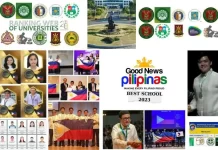
Discover Philippine Education Excellence: Unveiling the Top 10 Good School Stories…

Discover Filipino Athletic Excellence: Unveiling the Top 10 Inspiring Sports Stories…
Contest: filipino writers’ prize worth php250k now accepting entries.

The contest for the 2023 Filipino Writers’ Prize worth Php250,000 is now accepting entries for the biennial award given out by the National Commission for Culture and the Arts (NCCA).
The award in the gross amount of PHP 250,000 will assist the winner during the writing stage of the project. The award is good for one year, after which a polished final manuscript of the writing project will be submitted to the NCCA, particularly the National Committee on Literary Arts (NCLA) for possible publication or staging.
The NCCA Writers’ Prize award is given to five writers, one for each category, namely:
- essay/creative non-fiction
- short story
The National Commission for Culture and the Arts (NCCA) issued the call for entries with the deadline set for June 30.
Applicants must submit:
- an accomplished entry form (in PDF format)
- notarized declaration with consent and release (in PDF format)
- applicant’s curriculum vitae
- 3-5 page concept paper discussing the rationale and significance of the project
- initial output (refer to the table)
The Writers' Prize PHP 250,000 is given to 5 writers, one for each category: poetry, novel, essay/creative non-fiction, short story, and drama @NCCAOfficial https://t.co/iPVqAGvpgK — GoodNewsPilipinas.com (@GoodNewsPinas_) February 28, 2023
All entries shall be addressed and sent via email to: NCCA WRITERS’ PRIZE Secretariat Program Management Division (PMD) – Arts Section NATIONAL COMMISSION FOR CULTURE AND THE ARTS [email protected]
The NCCA also provides project grants. Here’s how to apply .
NCCA’s children’s TV show Heneral Tuna is now in book form .
SHARE THIS ARTICLE to spread the word about the Filipino Writers’ Prize call for entries!
Good News Pilipinas is a Lasallian Scholarum Awardee . TELL US your good news story tips by messaging GoodNewsPilipinas.com on Facebook , Twitter , Instagram , or e-mail [email protected] and WATCH Good News Pilipinas TV YouTube & Good News Pilipinas TikTok for more Filipino Pride stories!

- CALL FOR ENTRIES
- Filipino writers
- Filipino Writers accepting entries
- Writers' Prize
Get Your Dose of Good Vibes!
Power Up Your Positivity! Catch all the Good-Vibes! Join the GoodNewsPilipinas.com VIP list and get your daily dose of sunshine and Pinoy Pride! Unwrap stories that put Filipino awesomeness in your life! CLICK the subscribe button for our e-newsletter and turn your inbox into a fiesta of feel-good news! Inspire your day, fuel your pride! 🇵🇭✨
RELATED ARTICLES
Prulifetime income provides filipino families lifelong financial security, new law ensures disadvantaged students can take exams despite unpaid fees, upcat testing centers now available in all provinces, up adds new non-traditional admissions for students, top stories.
How to Track your Philippine National ID delivery

How to Check Your Voter Status for Philippine Elections

Rhea Santos leads ABS-CBN reporters, journalists for Filipino News in Canada

Philippine Science High School Student Wins First-Ever Gold for Philippines at International Astronomy & Astrophysics Olympiad

LIST: 15 Philippine paint brands with lead safety United States certification
Editor picks, goodnewspilipinas.com: only philippine website in world’s top 40 good..., rico hizon takes the lead in championing filipino pride, goodnewspilipinas.com triumphs with gold anvil award: a testament to..., embracing a new era: goodnewspilipinas.com’s trailblazing journey to the..., just in: good news pilipinas feature on freedom fighters..., popular posts, rhea santos leads abs-cbn reporters, journalists for filipino news..., philippine science high school student wins first-ever gold for..., list: 15 philippine paint brands with lead safety united..., popular category.
- Good Balita 1550
- Good Show 1385
- Good Sport 974
- Good Pinoys 952
- Good Advice 666
- Good Travel 613
- Good Tech 580
- Good Business 563
- Good School 536
- Good Deed 502
- Good Inspiration 334
- Good News Pilipinas! TV 79
- Good Savings 53
- Good MSME 51

Good News Pilipinas is a news and information website that highlights the good in the Filipino and the Philippines.
© 2024 GoodNewsPilipinas.com
Privacy Overview

9 Filipina Writers You Should Read Today
By Karen de Castro
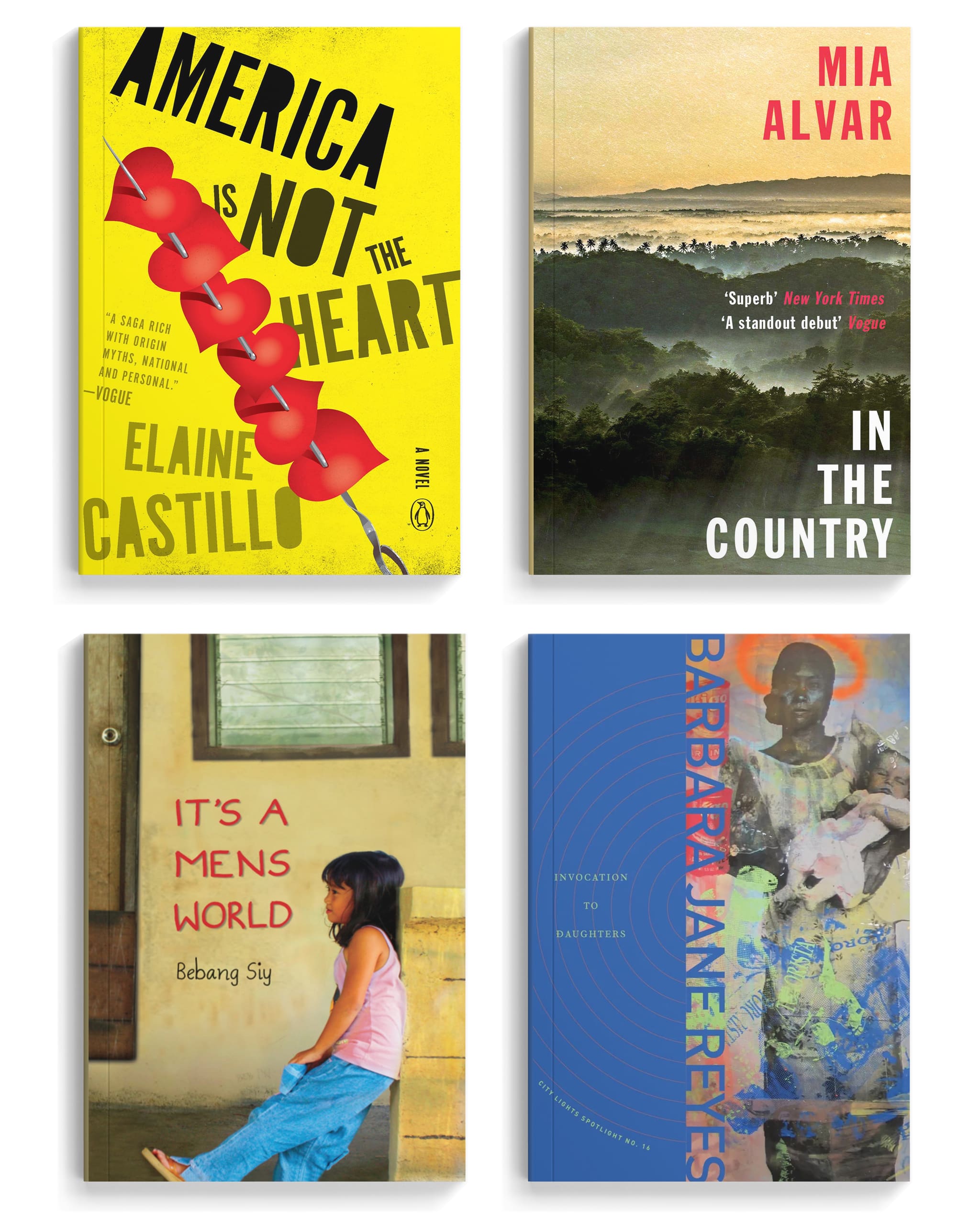
They are leading conversations about womanhood, cultural identity, and Filipino identity.
Since 1988, National Women’s Month has been observed in the Philippines every year in conjunction with International Women’s Day to celebrate women’s achievements, raise awareness and advocate for women’s equality, promote positive change to advance women, and fundraise for female-focused charities.
For Women’s Month, Vogue Philippines explores the works of these contemporary Filipina writers who are contributing to conversations about womanhood, Filipino identity , diaspora , gender and sexuality, and culture. Here are just some you should be adding to your reading list:
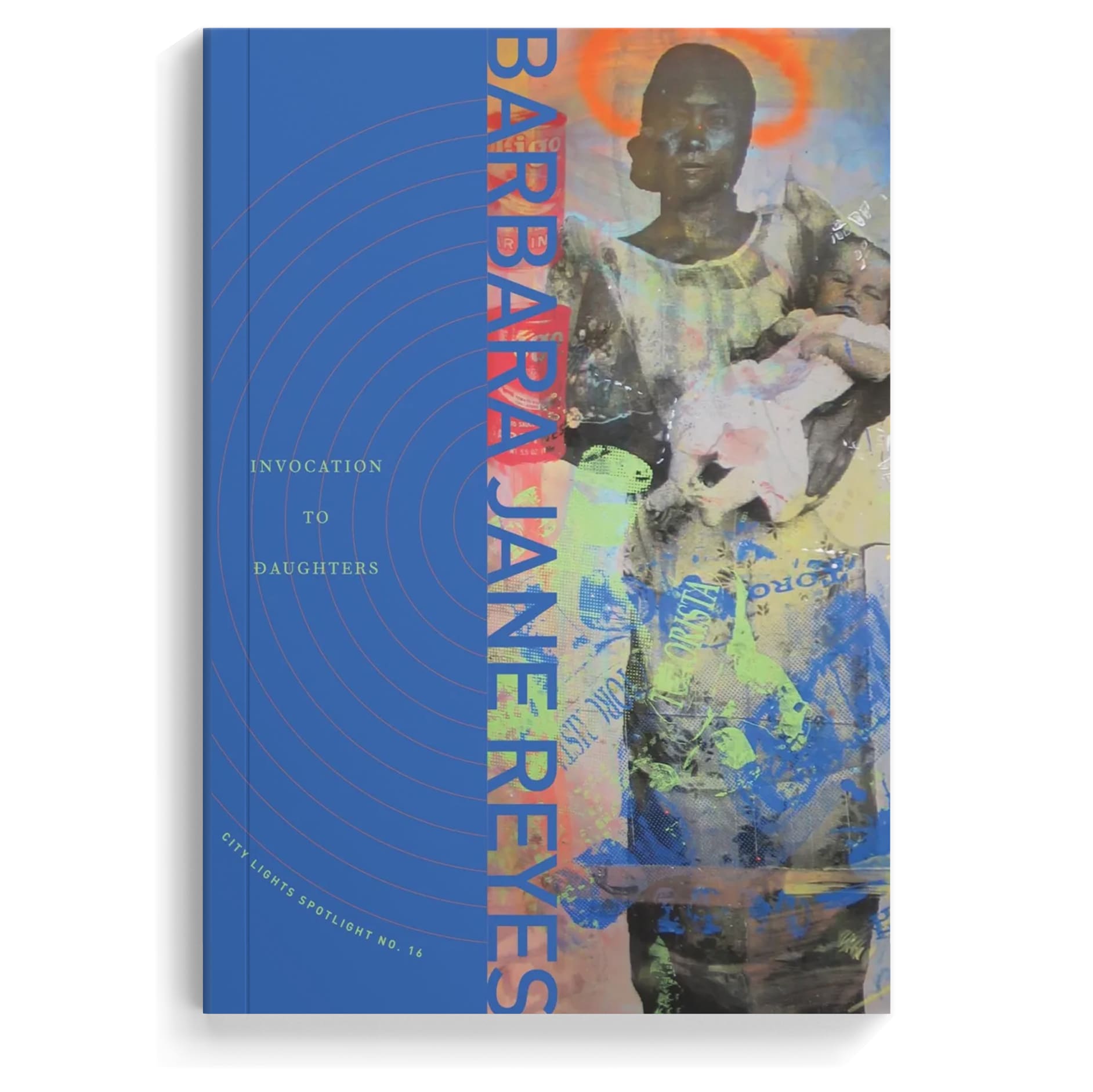
Barbara Jane Reyes
Born in Manila and raised in the San Francisco Bay area, Filipino-American poet Reyes writes about the complexities of diasporic identity, womanhood, and the human body. With works such as “ Invocation to Daughters” and “ Letters To A Young Brown Girl ,” Reyes uses poetry to discuss the nuances of multiple languages, multiple cultures, and multiple meanings. Her book Poeta en San Francisco won her the James Laughlin Award of the Academy of American Poets in 2005.
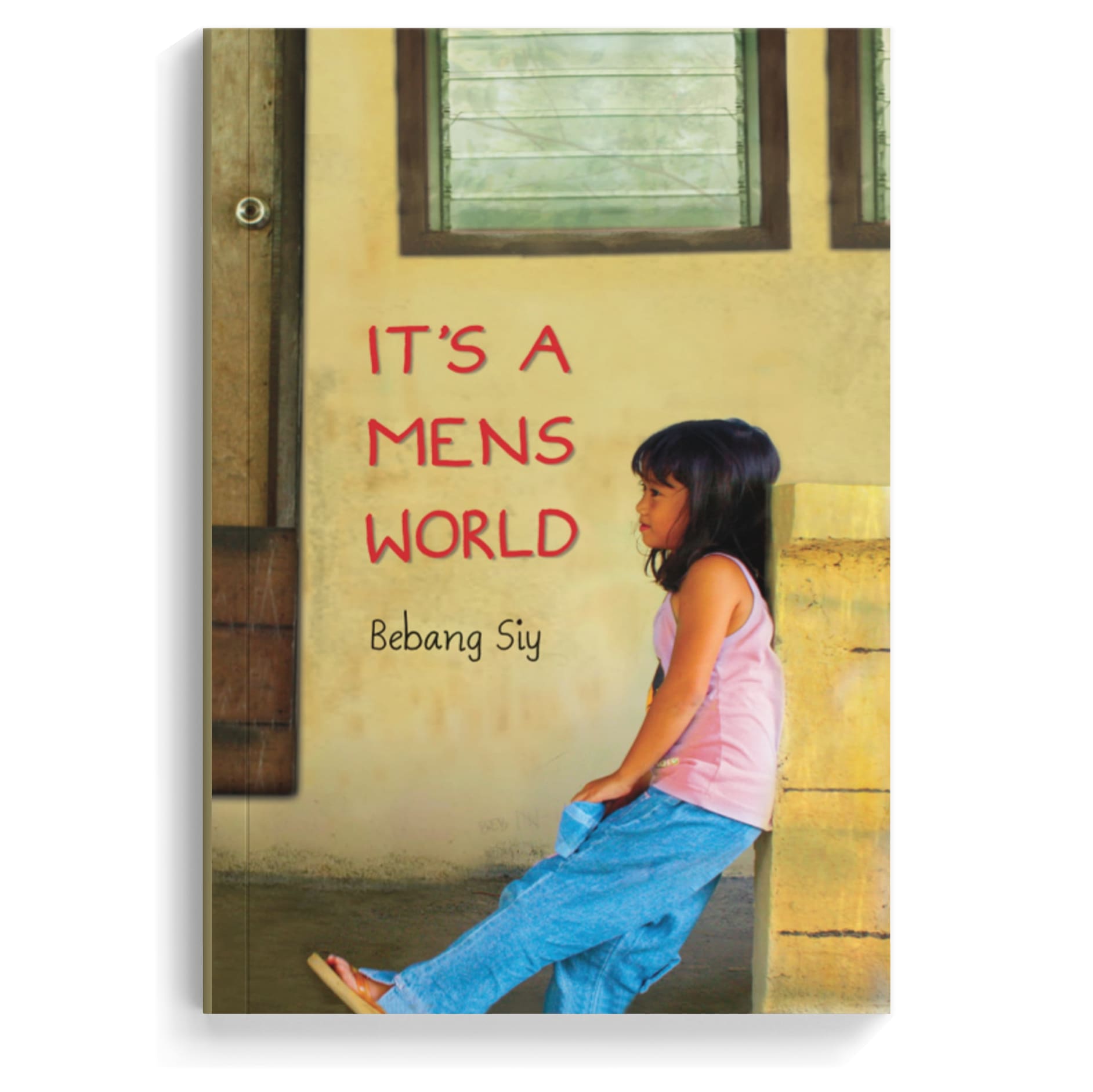
Beverly Wico Siy
In her book It’s A Mens World , writer, translator, and copyright advocate “Bebang” Wico Siy pulls from her personal experience of growing up Filipino, using observational humor to reflect on her background of growing up poor, tell stories about being part of the Filipino-Chinese community, and delve into issues of womanhood. Siy’s witty repartee and punchy Filipino humor won It’s A Mens World the Filipino Readers Choice Awards in 2012.

Daphne Palasi Andreades
In her debut novel Brown Girls , Filipino-American writer Andreades tells a coming-of-age story from the point of view of a collective narrator: brown girls from “ the dregs of Queens ” who grow into women, navigating successes, failures, and similar microaggressions that they all face.
She draws upon her own experience as the child of Filipino immigrants, depicting what life is like for people of color in the United States in an interview with the Asian American Writers’ Workshop: “a beautiful mix of people, cultures, languages, and beliefs, all co-existing; yet many of these people are invisible within the American society or perceived as outsiders when, in fact, they belong just as much to anyone else.”
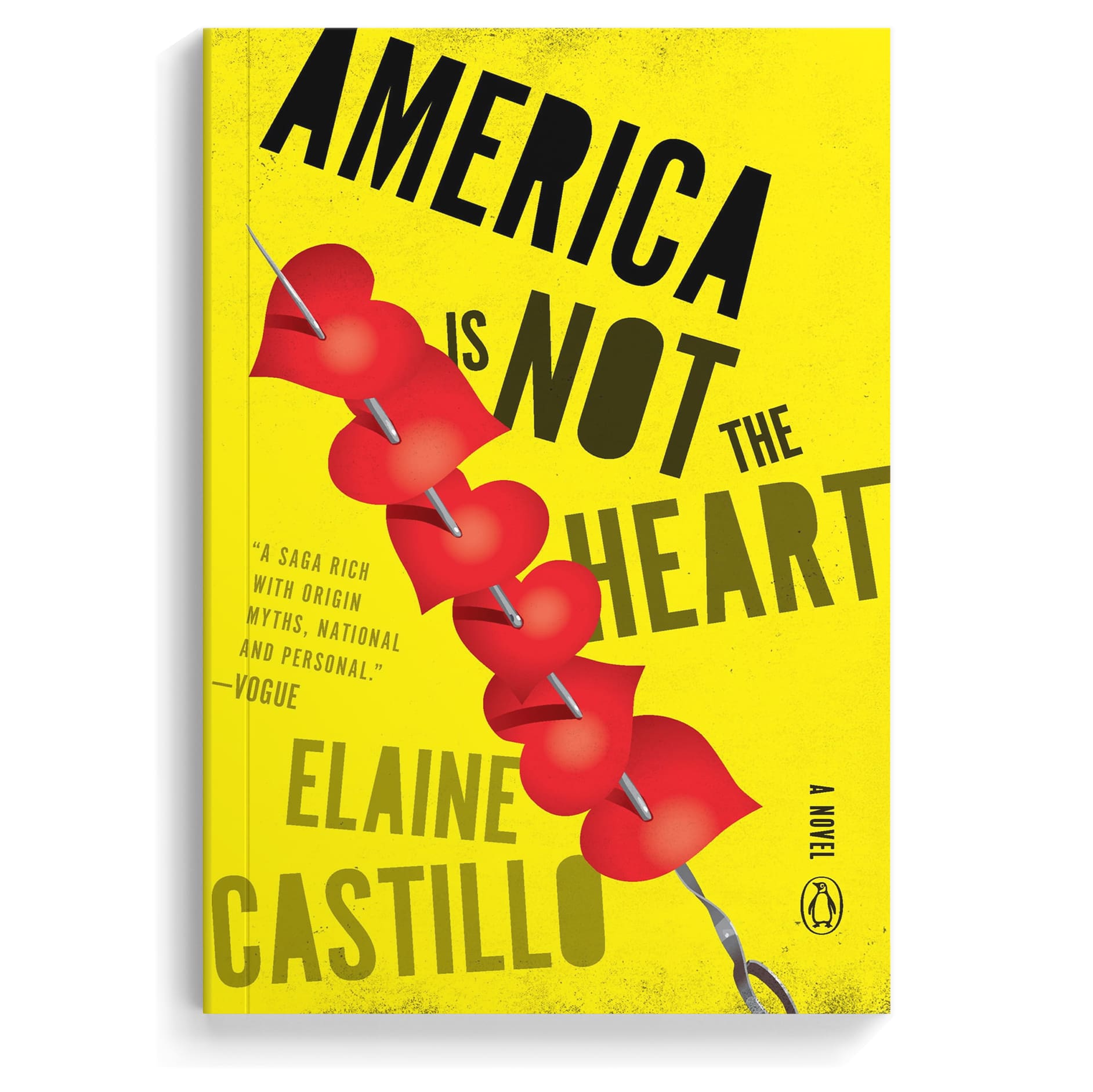
Elaine Castillo
Castillo is most known for her debut novel, America Is Not The Heart , which received critical acclaim. The novel delves into the lives of Filipino immigrants in San Francisco’s East Bay area, touching upon the political climate during the 1980s and 1990s and the immigrant communities that popped up in suburban United States as a result.
She immerses you into the rich layers of multilingual and multicultural immigrant experiences through her use of five languages throughout the novel (English, Spanish, Tagalog, Pangasinan, and Ilocano). Making her main character bisexual is personal. “For me it was very important to write about queer women, bi women in particular, because I’m also bi and I don’t see any representations of bi women anywhere, especially not bi Filipina or Asian Americans,” she says in an interview .
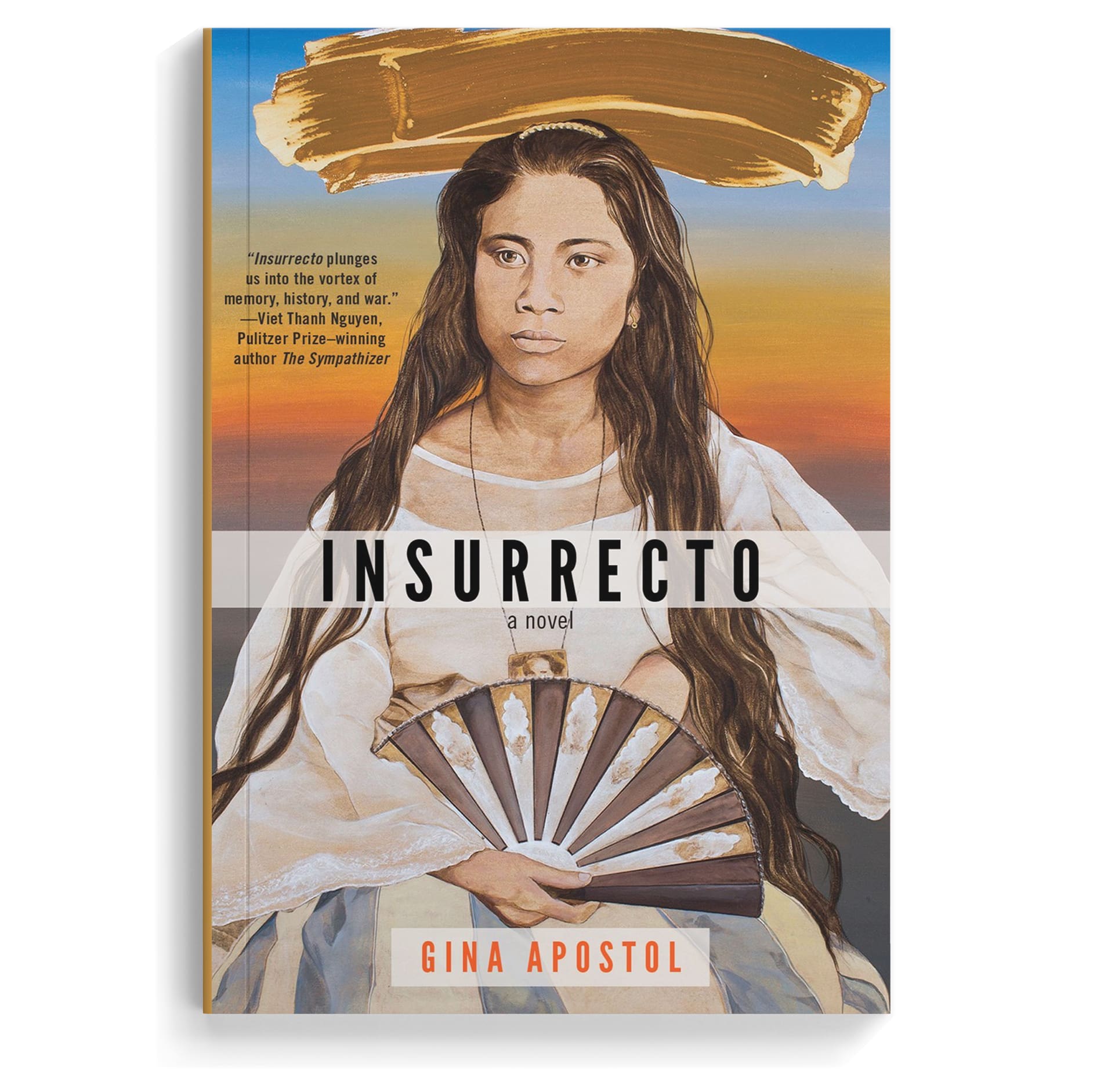
Gina Apostol
A finalist for the Dayton Literary Peace Prize, Apostol’s Insurrecto roots its story around one of the bloodiest incidents in the Philippine-American War: the 1901 Balangiga incident . The novel probes into two women’s ideas for retelling history, weaving multiple intricate narratives into a story of cultural appropriation, history and power, and how these all play into the main characters’ identities and motivations.
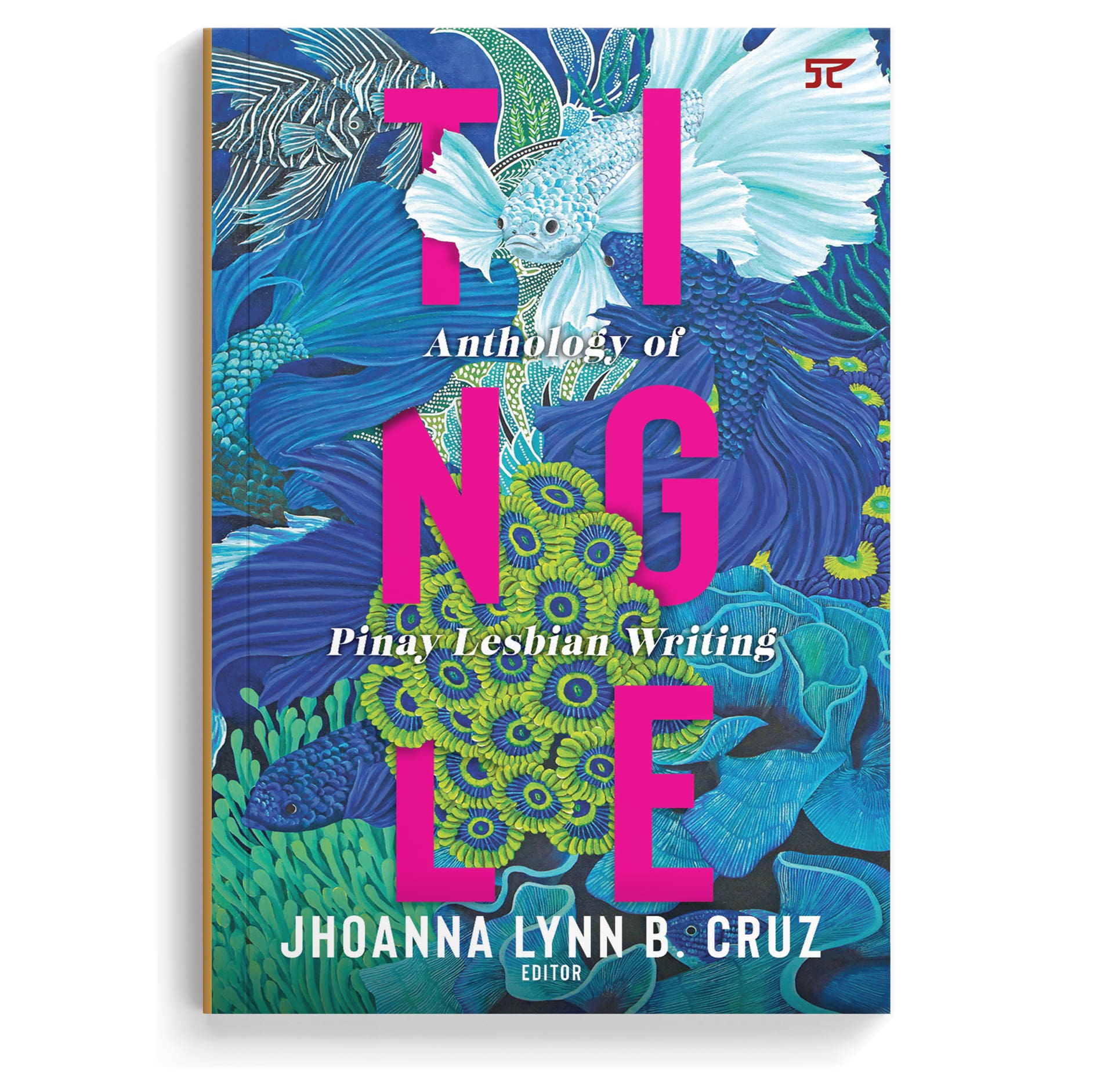
Jhoanna Lynn B. Cruz
“What makes you tingle as a lesbian?” This was the prompt that Palanca Award winner Cruz gave to the contributors who became part of Tingle: Anthology of Filipina Lesbian Writing . While there are compilations of queer writing published in the Philippines, an anthology of the literary works of Filipino lesbians is so overdue that she says “some of our lesbian writers have stopped writing or being a lesbian” in the book’s introduction. The result is a collection of pieces from writers who define what women loving women is like in their own terms.
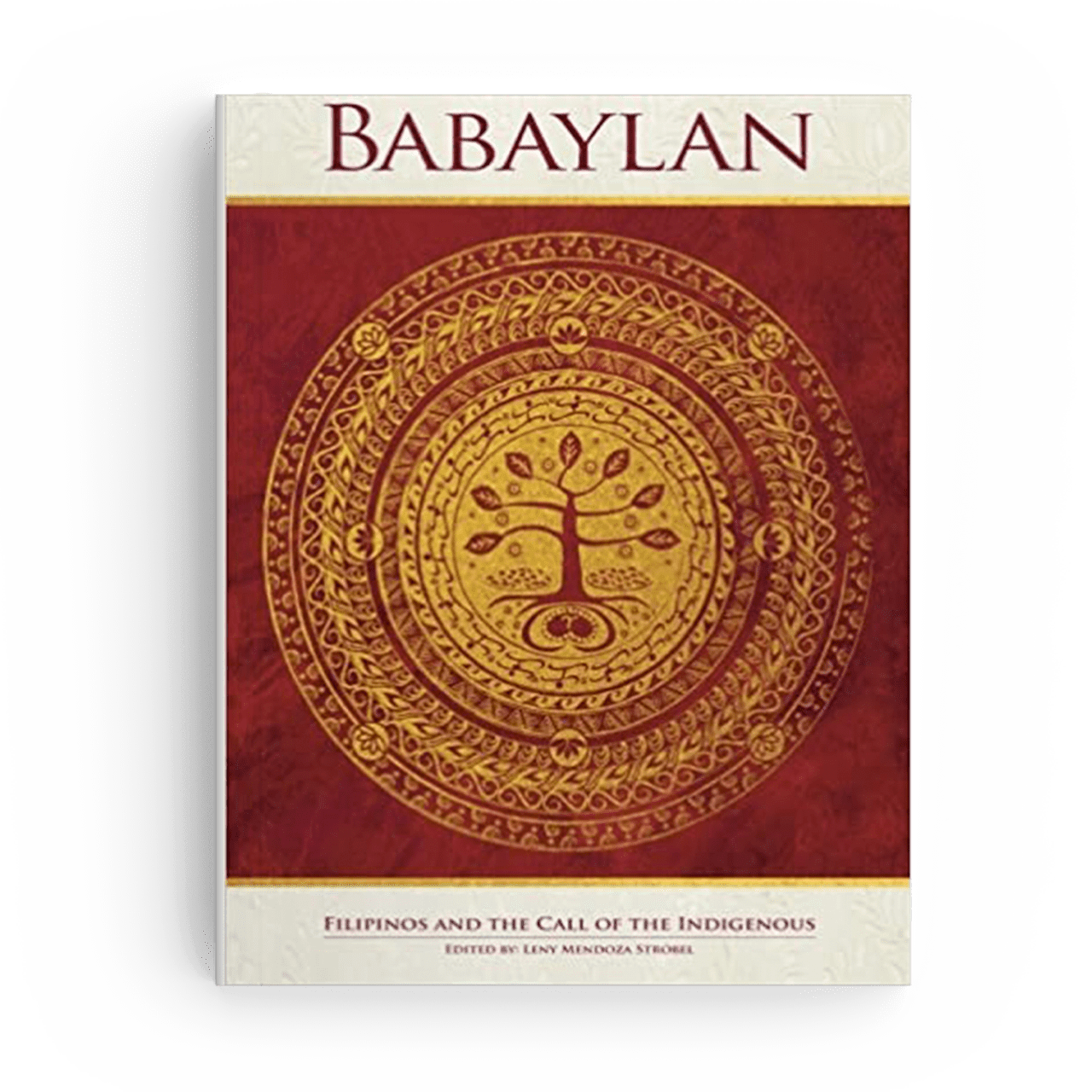
Leny Mendoza Strobel
Founder of Center for Babaylan Studies, Strobel explores the rich history and tradition of the Babaylan in her collection of essays, Babaylan: Filipinos and The Call of The Indigenous . The essays and personal narratives all share one main idea : “If we can articulate the Babaylan’s healing practice and Kapwa psychology as our intellectual, emotional, cultural, and spiritual capital—then we have much to offer to each other, to our communities and to the world.”
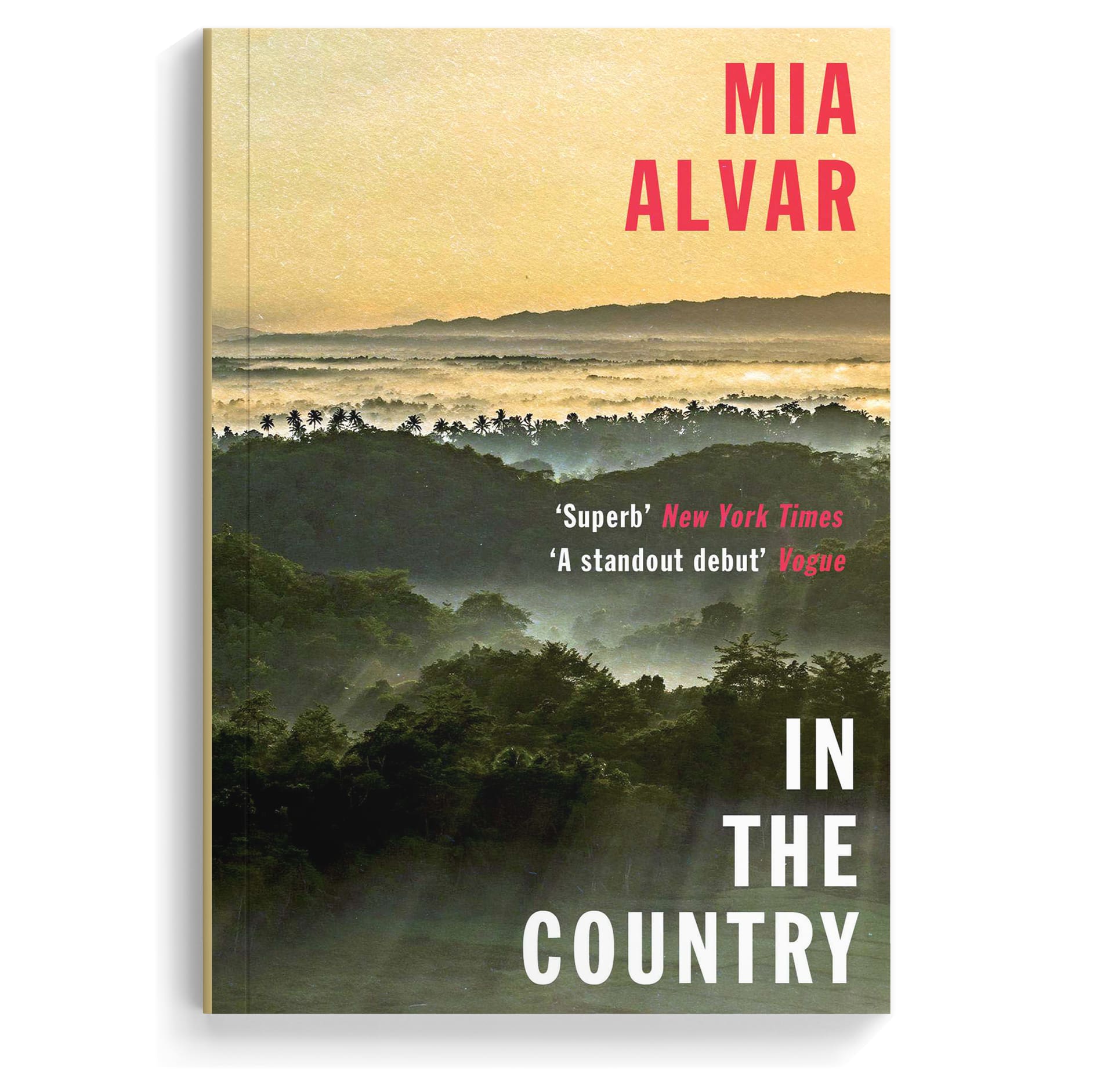
Mia Alvar
PEN/Robert W. Bingham Prize winner Alvar’s most notable work is the short story compilation In The Country . The critically acclaimed debut work dives into the Philippine diaspora through nine short stories of exiles, wanderers, and emigrants who leave the Philippines to start over in the United States, the Middle East, and elsewhere, with some turning back. Alvar’s novel delves into themes of loss, displacement, and the longing for connections across borders.
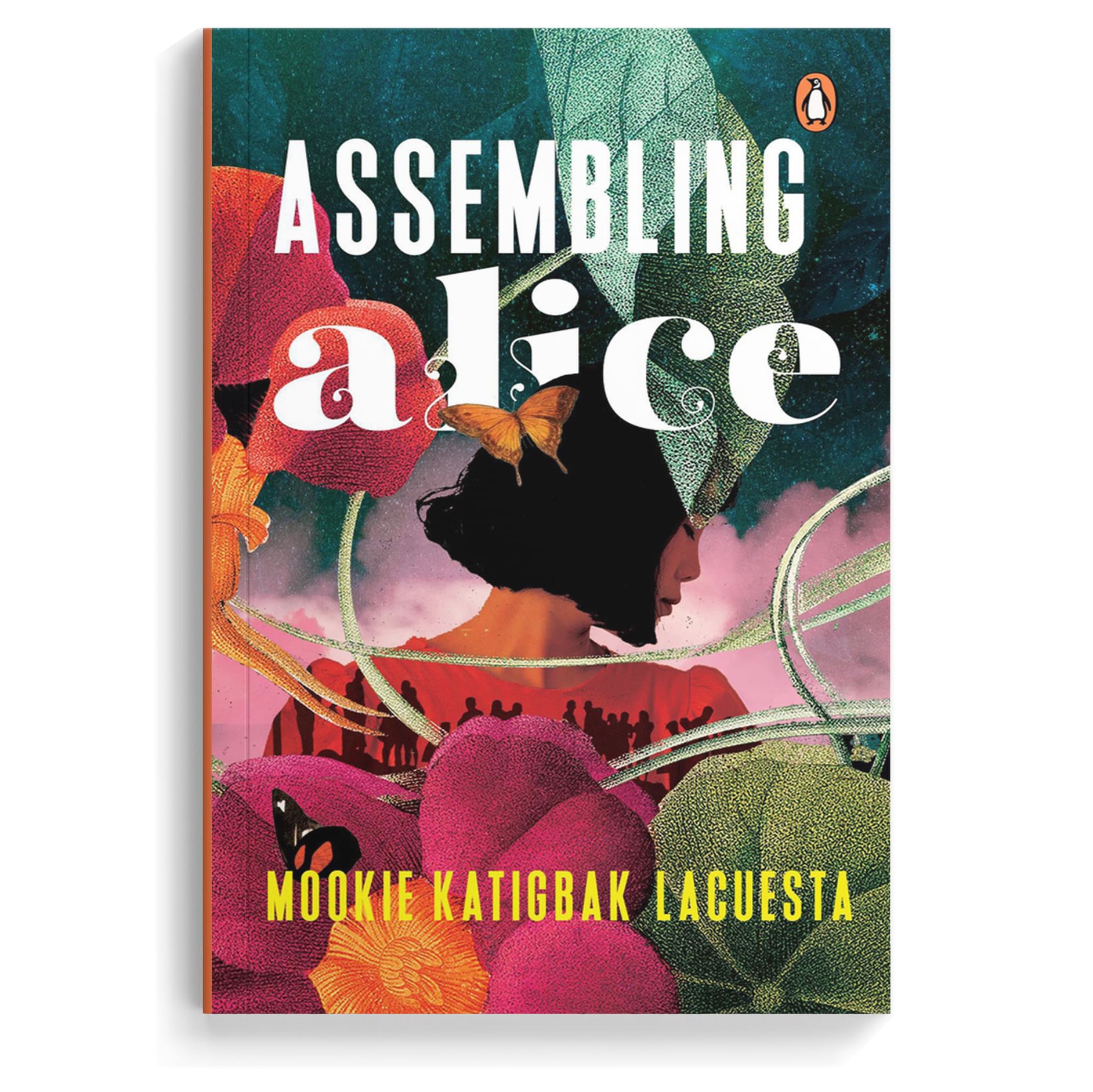
Mookie Katigbak Lacuesta
Palanca Award and Philippines Free Press Award-winning poet Katigbak-Lacuesta’s poetry collections talk about a wide range of topics: love, power dynamics between men and women, the Filipino’s colonial past, diaspora—all presented in lyrical form. But if you prefer to read prose, her latest release, Assembling Alice , is a “biofiction” featuring a real-life person with a fictionalized story centered around nation-building, family storytelling, and memory.
- Filipino Models on the Power of Representation and Identity
- 6 Must-Read Books About Philippine Life And Literature
- 10 Books On The Filipino Experience
- An Excerpt From Mia Manansala’s New Cozy Mystery, Blackmail and Bibingka
- Filipina Authors
- Philippine Literature

Filipino short stories we read in high school that we want to see onscreen
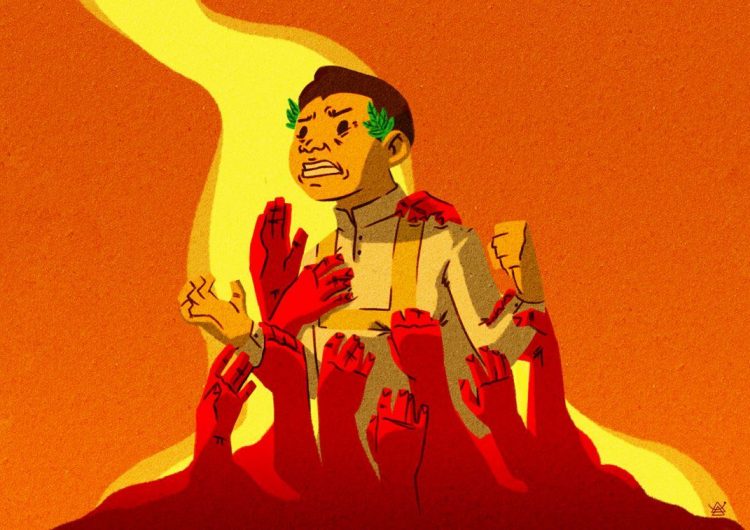
The Supreme Court might disagree, but the Filipino subject is one of the last lungs of our national identity. What Tanggol Wika (Alyansa ng Mga Tagapagtanggol ng Wika Filipino) said last year was true—removing it from the college curriculum is like cultural genocide. As bad luck and poor decision-making would have it, the future generations got robbed of the chance. Now what?
Read more : 6 Filipino literature that deserve your undivided attention
This is not the end-all be-all, but let’s trace back to when studying Filipino was at its peak for most of us: high school. Aside from bouts of sabayang pagbigkas practice hours, heated Balagtasan contests and countless plays recreating iconic “Noli Me Tangere” and “El Filibusterismo” scenes, the subject propelled our appreciation for Philippine literature. This was through the award-winning Filipino short stories we were tasked to read—and most importantly—analyze. Admit it: You enjoyed it.
Now, with Bob Ong’s thriller novel “Ang Mga Kaibigan ni Mama Susan” and Ricky Lee’s short story “Servando Magdamag,” turning into films soon, we’re pumped now more than ever. What if we give the same opportunity to the stories that grew up with us? Here are award-winning stories written by Filipino authors that we want to see onscreen—whether as a show or a movie. It’s the spotlight Philippine literature deserves.
Read more: These award-winning books show why PH literature belongs in college curriculums
“Ang Kalupi” by Benjamin Pascual
For a story that occurs in just one afternoon, “Ang Kalupi” twists our heads in unapologetic 180-degree fashion. While buying a graduation gift for her favorite kid at the market, Aling Marta finds out that her wallet is missing. As she feels her pockets, a scene from minutes ago replays: A young boy—wearing grubby jeans and a torn shirt—bumped her on the way. Well, that’s what’s going on in her mind at least. But we could tell you it was purely an accident.
You could guess what happens next. Aling Marta storms off, confronts the kid and threatens the life out of him. It was probably the most stressful four (or five or six) hours of their lives. But the wildness of this story isn’t just rooted in its plot twists. It’s also in the hard truth it offers to the readers because, yeah, we’ve all judged each other a little too much. But “Ang Kalupi” tells us that empathy should win over. Society’s prejudice about the lower class is more horrifying than we think.
“Sandaang Damit” by Fanny Garcia
I don’t know about you, but the quaint title of this Palanca Award-winning piece conjures the visual of many, many colors. It’s a happy story for sure, right?
Don’t make assumptions yet until you meet this young girl. In her class, she’s often quiet and alone. Her classmates dread how she wears the same clothes and doesn’t bring food to school. The teases grow louder and louder. Eventually, she decides she’s not having it anymore. Then, surprise, she tells her classmates she has 100 clothes at home. They believe her. Vivid and powerful, this story tackles the helplessness of those who are discriminated against.
“Dead Stars” by Paz Marquez Benitez
Before all the hit Wattpad fics and digestible internet meet cutes, there was “Dead Stars.” An OG reading material in schools, this story gives a detailed depiction of how love, relationships and fidelity played out in early 20th century Philippines.
Descriptive and reasonably frustrating, this story shows us how people can grow bad when stuck in fantasies and illusions of love. Because of this selfishness, people can be trapped in timelines they shouldn’t stay in—and eventually ruin what they have in the present. This story written in 1925 ushered in an era of Philippine lit writing in English. Aside from that, this was also used as an early feminist material as it tried to defy the stereotype that men are more strong-willed and women are more emotional.
Read more: Remember when Wattpad made us all writers?
“Ang Pamana” by Lamberto Gabriel
What’s in a farmer’s life? “Ang Pamana” follows the story of farmers Mang Karyas and Aling Asyang and their son Kiyel. Its clever pacing makes way for vivid details, making us flies on the wall of the family’s tale of hardships in the fields. Like sticky notes posted all over the house, Mang Karyas and Aling Asyang repeatedly tell Kiyel not to be a farmer when he grows up.
Eventually, Kiyel gets the privilege of graduating with a college degree. When he’s set to come home to his hometown and meet his parents again, Mang Karyas is on the edge of his seat wanting to see how Kiyel finally made it in life. However, hell breaks loose when Kiyel reveals he took up agriculture. Painful and raw, this story highlights how farmers in the Philippines are unrecognized and deprived of a good life.
Read more: For your consideration: 5 TV shows based on Philippine mythology
Quite ironic how the backbone of our nation’s economy is experiencing the most difficult state. Quite horrifying how this story from decades ago still mirrors the present .
But even though the issues depicted in classic literature remain today, we shouldn’t forget that there can be a redeeming curve in the end. And we can’t wait to see that onscreen, too.
Art by Marx Reinhart Fidel
- filipino literature
- filipino short stories
- film adaptations
- philippine literature

More From Books
Manila comics fair: a love letter to komiks creators everywhere, how the spiritual side of ‘dune’ helped my mental health, recreate ‘kiki’s delivery service’ food with this new cook book, you might also like.

Discover how the spiritual themes in the “Dune” novels provided an introspection that...

Okay, can we stop romanticizing Filipino resilience?
“Basta Pinoy, kaya yan!” a talking head exclaims from a broken television hammered...

Y2K fashion choices that need a redemption arc
Y2K, for some of us, was the best decade of our lives. Not...

Our resident dancer judges that cringey, viral COVID dance demo
Every week, I hate something new about this pandemic. One of my top...

Taika Waititi is so hot, he’s hurting my feelings
My devotion to Taika Waititi is similar to his films: whimsical yet lovelorn....

10 MVs that make us feel a certain way
Music videos are precious gifts from the universe. They can be time capsules...

A love letter to the amazing women of ‘Scott Pilgrim’
“Scott Pilgrim vs. the World” didn’t age well as I hoped it would....

Beyond the boards of Cebu’s skate community
Skating has come a long way from what it was decades ago. No,...

If you feel like turning off your brain, play these weird AF games
I feel like I’m just going through my days disassociating. The vibe is...

#ScoutGapYear diaries: The taxing 24 hours of young medical frontliners
For most of us, graduation means being thrown into the water—filing our taxes,...

An investigative essay on why Adam Driver is hot, actually
It was Dec. 17, 2015, 12:45 p.m when I first saw him. “The...

Why I love Park Seo-joon: A “scientific” study
Observation: Alexa play “Your Type” by Carly Rae Jepsen When I was under...

How my thirst for Howl cured me of my softboi fixation
I don’t remember who my first crush was (if my brain decides to...
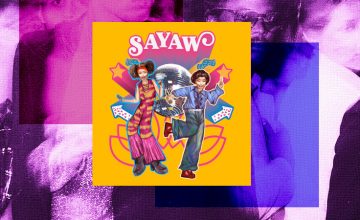
Pamcy’s ‘Sayaw’ EP is a love letter to late-night gigs we temporarily lost
We fell in love with Pamela Fernandez a.k.a. Pamcy three years ago. With...
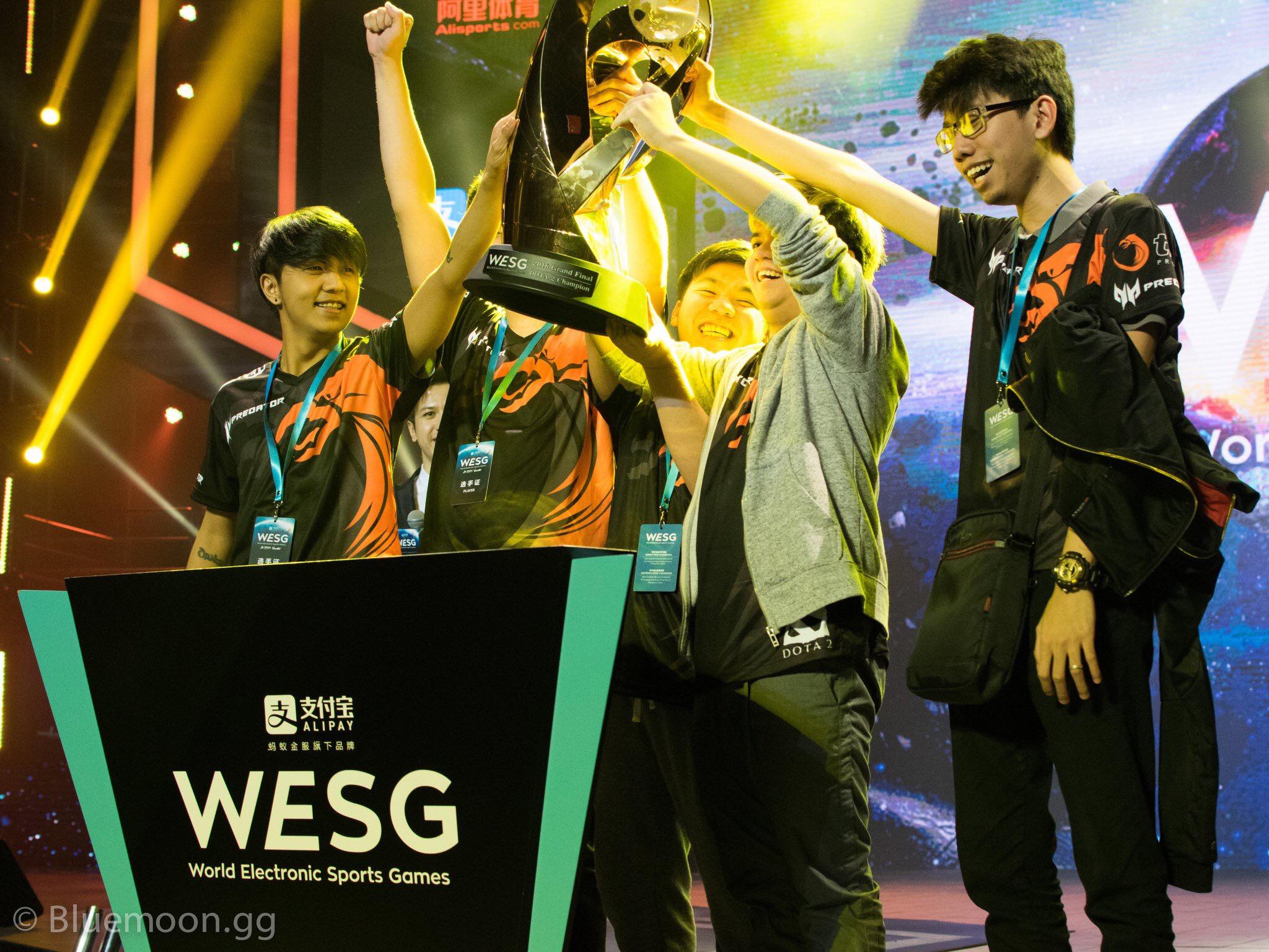
This Filipino eSports Team Just Won 40 Million Pesos
TNC Pro Team, composed of Samson "Sam_H" Hidalgo, Marc "Raven" Fausto, Carlo "Kuku"...

Dont Blame The Kids’ “Telefuture – Delivery 1” Collection is a nostalgia trip
Nostalgia is a powerful thing. One could argue that everything we see today...
Log in Club Matryoshka’s first virtual music festival this April
You can now stream these tba studios films for free.

Why we shouldn’t pressure ourselves to be successful in our 20s
There’s this line from a movie that I’ve always liked. It goes, “Change your mind and change it again, because nothing’s permanent. So make as many mistakes as you can....

Why women freeze when they get harassed
I was sick when a bishop harassed Ariana Grande in everyone’s full view during Aretha Franklin’s funeral. The video, which went viral on Twitter, triggered fans and people on the...

This dye is perfect for Filipinos who don’t like bleaching their hair
For those Filipinos who love dyeing their hair in crazy colors--myself included--we all know the pains and struggles of bleaching. It’s itchy, hot, and could possibly burn your scalp if...

The 5 Scoutmag.ph Stories You Need To Read This Week (12/10/2016)
If you weren't all up on our social media accounts (@scoutmagph on IG, Twitter, and Snapchat by the way) you missed out on our best stories this week. Here they...

This highlighter is for sleep-deprived students who still wanna look bomb
Ah, finals week: The collegiate experience in its rawest form, when students are empty husks of human beings, occasionally filled with liters worth of coffee pots and a jumble of...
Kathang Pinoy
Filipino in thoughts and words.
Famous Essays and Speeches by Filipinos
- My Husband's Roommate
- Where is the Patis?
- I Am A Filipino
- This I Believe
- The Philippines A Century Hence by José Rizal (Translated by Charles E. Derbyshire) Part I
- The Philippines A Century Hence by José Rizal (Translated by Charles E. Derbyshire) Part II
- The Philippines A Century Hence by José Rizal (Translated by Charles E. Derbyshire) Part III
- The Philippines A Century Hence by José Rizal (Translated by Charles E. Derbyshire) Part IV
- The Indolence of the Filipinos by José Rizal (Translated by Charles E. Derbyshire)
- The Filipino Is Worth Dying For
- 1983 Arrival Speech of Ninoy Aquino
- Philippines
- The Filipino Authors You Should...
The 7 Most Legendary Filipino Authors

A country shaped by centuries of colonization by violent wars, long-lasting political upheaval, and the idyllic beauty of its islands, the Philippines offers writers plenty of material to work with. In stories drawn from this complex heritage, Filipino authors stand out for their creative, compelling voices. Culture Trip rounds up seven of the best literary talents to come from the Philippines.
Jessica hagedorn.
Best known for her 1990 novel Dogeaters , Jessica Hagedorn was born and raised in the Philippines and relocated to San Francisco in her teens. Hagedorn’s ethnic heritage is a mix of Spanish, Filipino, French, Irish, and Chinese. Dogeaters , which won the American Book Award and was a finalist for the National Book Award, shines a light on the many layers of Filipino society, especially the American influence prevalent in the entertainment industry. Hagedorn is also a poet and playwright. Her first play, Mango Tango , was produced by Joseph Papp in 1978, the same year she moved to New York, where she currently lives with her daughters.
Sionil Jose

A writer deeply concerned with social justice, F. Sionil Jose’s novels have been translated into 22 languages, and he’s one of the most widely read Filipino authors. Sionil Jose’s Rosales Saga is a five-volume work that follows the Samson family and their changing fortunes over a 100-year timeframe. Sionil Jose’s books are especially illuminating for anyone interested in provincial life in the Philippines, the revolution against Spain, and the framework of the Filipino family. His anti-elitist views have made him a somewhat unpopular author within the Philippines, but Sionil Jose’s works are among the most highly acclaimed internationally of any Filipino writer. He won the Ramon Magsaysay Award for Literature in 1980.
Nick Joaquin
Winning the National Artist award for Literature, Nick Joaquín is probably the most esteemed writer the Philippines has produced. Joaquin came from a well-educated family and was published at the early age of 17. After winning a scholarship in a nationwide essay contest, he left the Philippines to study in Hong Kong. On his return to Manila he worked for many years as a journalist, and his highly intellectual writing raised the standards of journalism in the country. Joaquin’s book, The Woman With Two Navels is essential reading in Philippine literature. However many of his short stories, such as “May Day Eve,” are extremely accessible and enjoyable for those new to the Philippines.
Merlinda Bobis

Award-winning writer Merlinda Bobis started off as a painter, but grew into a writer as “painting with words was cheaper.” Bobis’ books, short stories, and poems tell of lesser-known aspects of Filipino life, often from a strong feminist stance. One of her most well-known novels, Fish-Hair Woman , describes a romance between a young village woman and an Australian soldier in the middle of a harrowing conflict that threatens the entire province. The Australian called it a “superb novel” that “maintains its tragic intensity throughout.” Bobis has also won the international Prix Italia award for her play Rita’s Lullaby and the Steele Rudd Award for her short story “White Turtle.”
Jose Dalisay Jr.
Jose Dalisay Jr. writes a popular online column where he’s more commonly known by his pen name, Butch Dalisay. Dalisay was imprisoned during Martial Law, and his experiences from this portion of Philippine history are brought to life in his first novel, Killing Time in a Warm Place . His second novel, Soledad’s Sister tackles the plight of overseas Filipino workers, and was shortlisted for the Man Asian Literary Prize in 2007. Within the Philippines, Dalisay has won 16 Palanca Awards, the country’s highest prize for literature.
Luis Francia

Award-winning author Luis Francia has lived in New York for decades, but his experiences of growing up in the Philippines continue to shape the stories he tells the world. The poet, author, and teacher emigrated to the U.S. after finishing college, where he wrote and co-edited the Village Voice newspaper for more than 20 years. His memoir Eye of the Fish: A Personal Archipelago won a PEN Open Book Award and an Asian American Literary Award. Amitav Ghosh, author of The Glass Palace , described Francia’s memoir as “a hugely readable travelogue and an indispensable guide to a fascinating and richly varied archipelago.”

Become a Culture Tripper!
Sign up to our newsletter to save up to $1,200 on our unique trips..
See privacy policy .
The Philippines’ national hero was also a prolific writer, poet, and essayist. Jose Rizal’s two novels, Noli me Tangere and El Filibusterismo were social commentaries that sharply revealed the injustices of Spanish colonization while praising the Filipino in his most natural state. The novels, which are surprisingly wry and romantic, crystallized the growing anti-Spanish sentiment and were banned within the Philippines. The execution of Jose Rizal at 35 years old set off the Philippine Revolution and paved the way for the country’s independence. Even without these dramatic events, Rizal’s books and his final poem, “Mi Ultimo Adios,” stand on their own literary merit, and have influenced scores of Filipino writers since.

The Best Beaches in Bohol, Philippines

The Best Campsites and Glampsites to Book in the Philippines

The Best Bars and Clubs in Makati, Manila

The Most Beautiful Islands in the Philippines

The 10 Best Things to See and Do in the Philippines

The 34 Most Beautiful Places to Visit in the Philippines

17 Unmissable Attractions in Manila, Philippines

The Best Hotels to Book in Baguio, the Philippines

The Philippines: 15 Fun and Unusual Experiences

11 Things You Should Know About Filipino Culture

The Best Hotels to Book In Tagaytay for Every Traveller

The Best Places to Live in the Philippines
Culture Trip Summer Sale
Save up to $1,200 on our unique small-group trips! Limited spots.

- Post ID: 1153276
- Sponsored? No
- View Payload

- COVID-19 Full Coverage
- Cover Stories
- Ulat Filipino
- Special Reports
- Personal Finance
- Other sports
- Pinoy Achievers
- Immigration Guide
- Science and Research
- Technology, Gadgets and Gaming
- Chika Minute
- Showbiz Abroad
- Family and Relationships
- Art and Culture
- Health and Wellness
- Shopping and Fashion
- Hobbies and Activities
- News Hardcore
- Walang Pasok
- Transportation
- Missing Persons
- Community Bulletin Board
- GMA Public Affairs
- State of the Nation
- Unang Balita
- Balitanghali
- News TV Live

Philippines wins 8 titles at World Travel Awards 2024

A major win for the Philippines!
The Philippines has once again cemented its status as one of Asia’s premier travel destinations by winning eight recognitions at the World Travel Awards (WTA) 2024 .
The Philippines was honored as Asia’s Leading Dive Destination for the sixth consecutive year since 2019 during the Asia & Oceania Gala Ceremony 2024 on Tuesday at the City of Dreams in Parañaque. It was also awarded the Asia’s Leading Beach Destination and Asia’s Leading Island Destination titles.
Some of the country’s top destinations took the spotlight at this year’s WTA, as well, with the historic Intramuros recognized as Asia’s Leading Tourist Attraction. At the same time, Boracay bagged the title of Asia’s Leading Luxury Island Destination and Cebu as Asia’s Leading Wedding Destination.
The Department of Tourism’s “Love the Philippines” campaign also won Asia’s Leading Marketing Campaign, while Tourism Secretary Christina Frasco was awarded the Transformational Leader Award in Tourism Governance.
The 31st edition of WTA was special since it marked the first time the Philippines hosted the prestigious travel and tourism awards gala ceremony .
In 2023, the Philippines also bagged several awards at the 30th WTA , including the first-ever Global Tourism Resilience award, which the country proudly shared with four other nations.
Known as the Oscars of the travel industry, the World Travel Awards is a London-based organization established in 1993, acknowledging excellence in travel and tourism at national, regional, and global levels.
— Hermes Joy Tunac/CDC, GMA Integrated News

IMAGES
VIDEO
COMMENTS
Philippine Science High School (PSHS) Grade 11 student Natalia Araña has won The Learning Network's Second Annual STEM Writing Contest organized by The New York Times for her essay, "Mycowood Violins: A Different Kind of Time Machine.". Araña was named one of the eleven international winners of the prestigious writing tilt, which ...
A Palanca medal or recognition is highly coveted in the Filipino writing community here and abroad. Since 1951, the Palanca Awards has conferred medals and certificates to a total of 2,526 Filipino authors, 26 of which became Hall of Fame awardees for having five first prize-winning works.
A Palanca medal or recognition is highly coveted in the Filipino writing community here and abroad. Since 1951, the Palanca Awards has conferred medals and certificates to a total of 2,526 Filipino authors, 26 of which became Hall of Fame awardees for having five first prize-winning works. In championing literature, the Palanca Awards also ...
Lysley Tenorio is a Filipino writer who wrote The Son of Good Fortune and Monstress. His work won many awards, including a National Endowment for the Arts fellowship, an Edmund White Award, and the Rome Prize. Many of his works have become plays. Tenorio focuses much of his writing on short stories. He was born in the Philippines and moved to ...
Maikling Kuwento. 1st Prize - Charmaine M. Lasar, Ang Value ng X Kapag Choppy si Mam. 2nd Prize - Abegail E. Pariente, Barangay Alitaptap. 3rd Prize - Alec Joshua B. Paradeza, Kung sa Bawat ...
has published 99 winning essays from our Essay Contest from the past five years in a coffee table book. We are excited to announce that a limited number of books are available to share with individuals who donate $99 or more (for 99 essays!) to Harvard GlobalWE. Donate today to receive a copy of the book.
It's a great institution," said Miguel Antonio Alfredo Luarca, whose full-length plays in both English and Filipino won in the 71st Carlos Palanca Memorial Awards for Literature. The ceremony was held on Monday, Nov. 27 at the Philippine International Convention Center. "The winning entry for the Dulang Ganap ng Haba titled Nekropolis is ...
I am a Filipino is an essay written by Carlos Peña Romulo, Sr. which was printed in The Philippines Herald on August 16, 1941. A Pulitzer Prize winner, passionate educator, intrepid journalist and effective diplomat, Romulo graduated from the University of the Philippines in 1918 with a Bachelor of Arts in Liberal Arts and Sciences….
A Palanca medal or recognition is highly coveted in the Filipino writing community here and abroad. Since 1951, the Palanca Awards has conferred medals and certificates to a total of 2,526 Filipino authors, 26 of whom became Hall of Fame awardees for having five first prize-winning works. ... Award-winning Bacolod broadcaster bags prize at 71st ...
Sanaysay (Essay in Filipino) First Prize - Kimberly Rose L. Pillo - 'Kung Paanong Nagmukha akong Sponge sa harap ng mga Pinggan' Second Prize - Al Joseph A. Lumen - 'Auslander: Mga ...
Voted a Best Book by Amazon in July of 2020, The Son of Good Fortune is a novel about a mother, Maxima, and her son, Excel, who are undocumented Filipino immigrants living in California. Both of them do their best to assimilate. make money and not get caught by the INS. But what they do not know about each other is the ultimate challenge ...
MANILA - Winners of the Essay Contest on Overseas Filipinos were feted during an awards ceremony February 26 at the Manila Hotel during the gala dinner of the Third Global Summit of Filipinos in ...
Organized by the Carlos Palanca Foundation, The Carlos Palanca Memorial Awards for Literature (CPMAL) is the longest running literary award in the Philippines. CPMAL was established in 1950 to inspire Filipino writers to improve their literary works. In the 1960s, the Palanca Awards Committee began committing funds to the publication of Palanca Award-winning plays. By 1975, […]
Across 70 years of the Palanca Awards, she said, "there have now been 2,472 authors (from 1951 to 2022), with the total number of winning works now standing at 2,561. The total number of Hall of ...
Here are the winners of Palanca awards in the short story or "maikling kwento" category in literature: 2018. Evasco, Eugene Y. (2nd Prize, Maikling Kwentong Pambata, "Siyap ng Isang Sisiw") Ortiz, Will P. (2nd Prize, Tula Para sa mga Bata, "Himbing na Kuting at Iba Pang Tula sa Ilalim ng Araw") Sicat-Cleto, Luna (3rd Prize ...
NCCA photo. The contest for the 2023 Filipino Writers' Prize worth Php250,000 is now accepting entries for the biennial award given out by the National Commission for Culture and the Arts (NCCA). The award in the gross amount of PHP 250,000 will assist the winner during the writing stage of the project. The award is good for one year, after ...
Mookie Katigbak Lacuesta. Palanca Award and Philippines Free Press Award-winning poet Katigbak-Lacuesta's poetry collections talk about a wide range of topics: love, power dynamics between men and women, the Filipino's colonial past, diaspora—all presented in lyrical form. But if you prefer to read prose, her latest release, Assembling ...
Award-winning essay by J. D., Bohol college Scholar. Making Heaven on Earth. In my own thoughts, heaven is a place where everyone is happy. It is where no one is hungry and there is no problem. Heaven is a very peaceful place where the people there are always singing and dancing.
Paco, at the time when the alleged crime occurred, was attending classes in Manila, an entirely different city on an entirely different island, more than 500 miles away. Classmates, teachers, passenger records, and photographic evidence stood irrevocably in his defense.
Here are award-winning stories written by Filipino authors that we want to see onscreen—whether as a show or a movie. It's the spotlight Philippine literature deserves. Read more: ... This story written in 1925 ushered in an era of Philippine lit writing in English. Aside from that, this was also used as an early feminist material as it ...
A Palanca medal or recognition is highly coveted in the Filipino writing community here and abroad. Since 1951, the Palanca Awards has conferred medals and certificates to a total of 2,526 Filipino authors, 26 of whom became Hall of Fame awardees for having five first prize-winning works. ... Award-winning Bacolod broadcaster bags prize at 71st ...
The Indolence of the Filipinos by José Rizal (Translated by Charles E. Derbyshire) Benigno "Ninoy" Aquino Jr. The Filipino Is Worth Dying For. 1983 Arrival Speech of Ninoy Aquino.
Nick Joaquin. Winning the National Artist award for Literature, Nick Joaquín is probably the most esteemed writer the Philippines has produced. Joaquin came from a well-educated family and was published at the early age of 17. After winning a scholarship in a nationwide essay contest, he left the Philippines to study in Hong Kong.
A major win for the Philippines! The Philippines has once again cemented its status as one of Asia's premier travel destinations by winning eight recognitions at the World Travel Awards (WTA) 2024.. The Philippines was honored as Asia's Leading Dive Destination for the sixth consecutive year since 2019 during the Asia & Oceania Gala Ceremony 2024 on Tuesday at the City of Dreams in Parañaque.